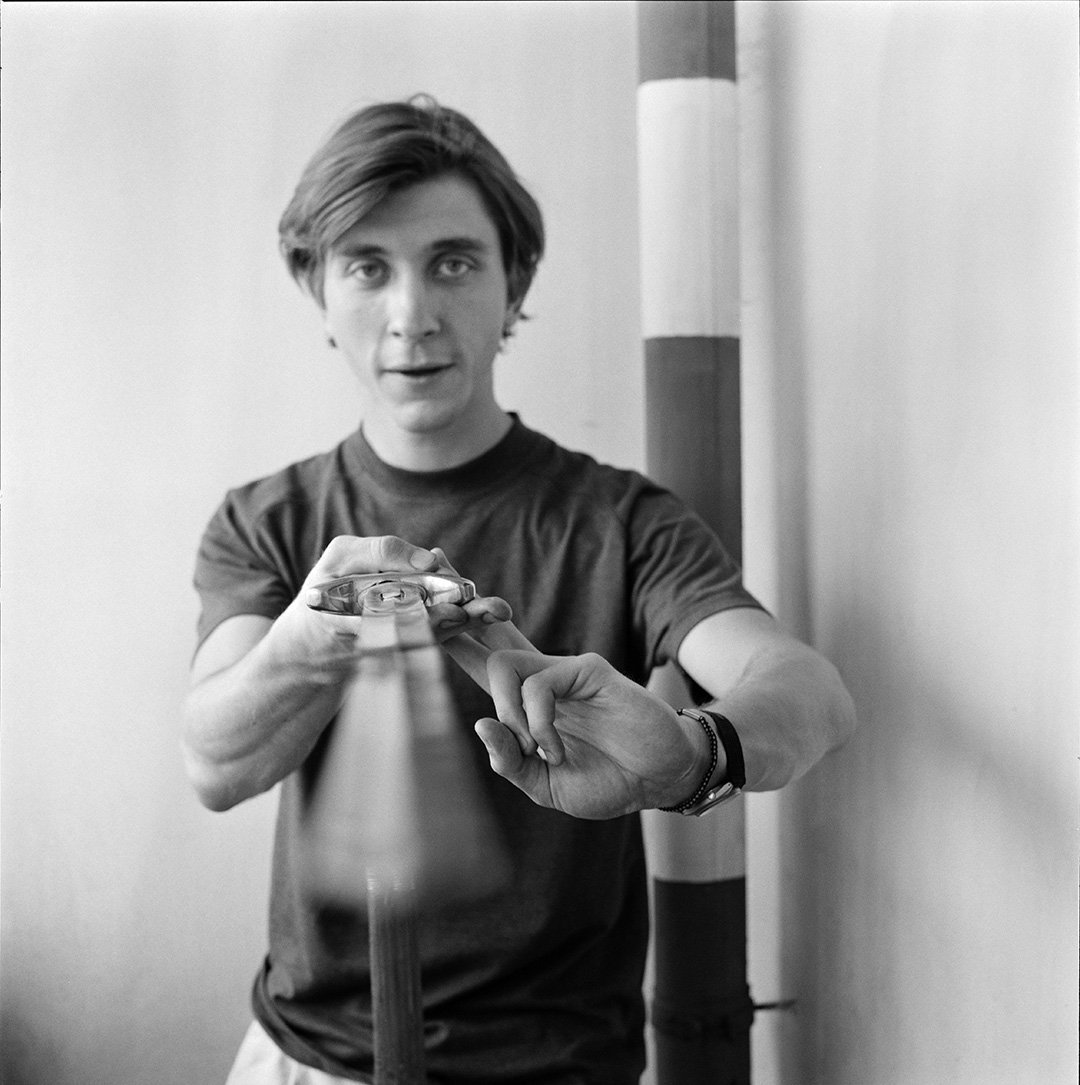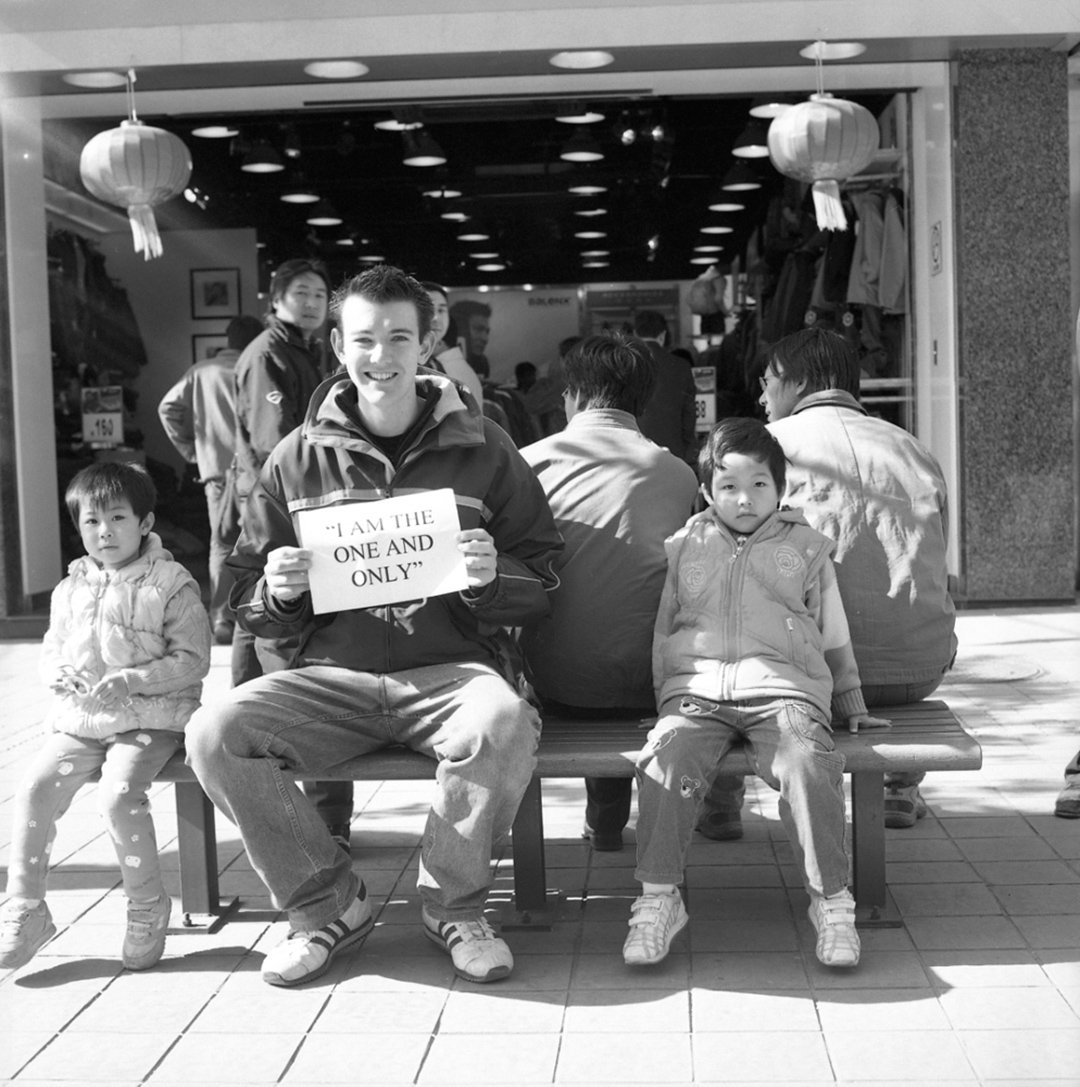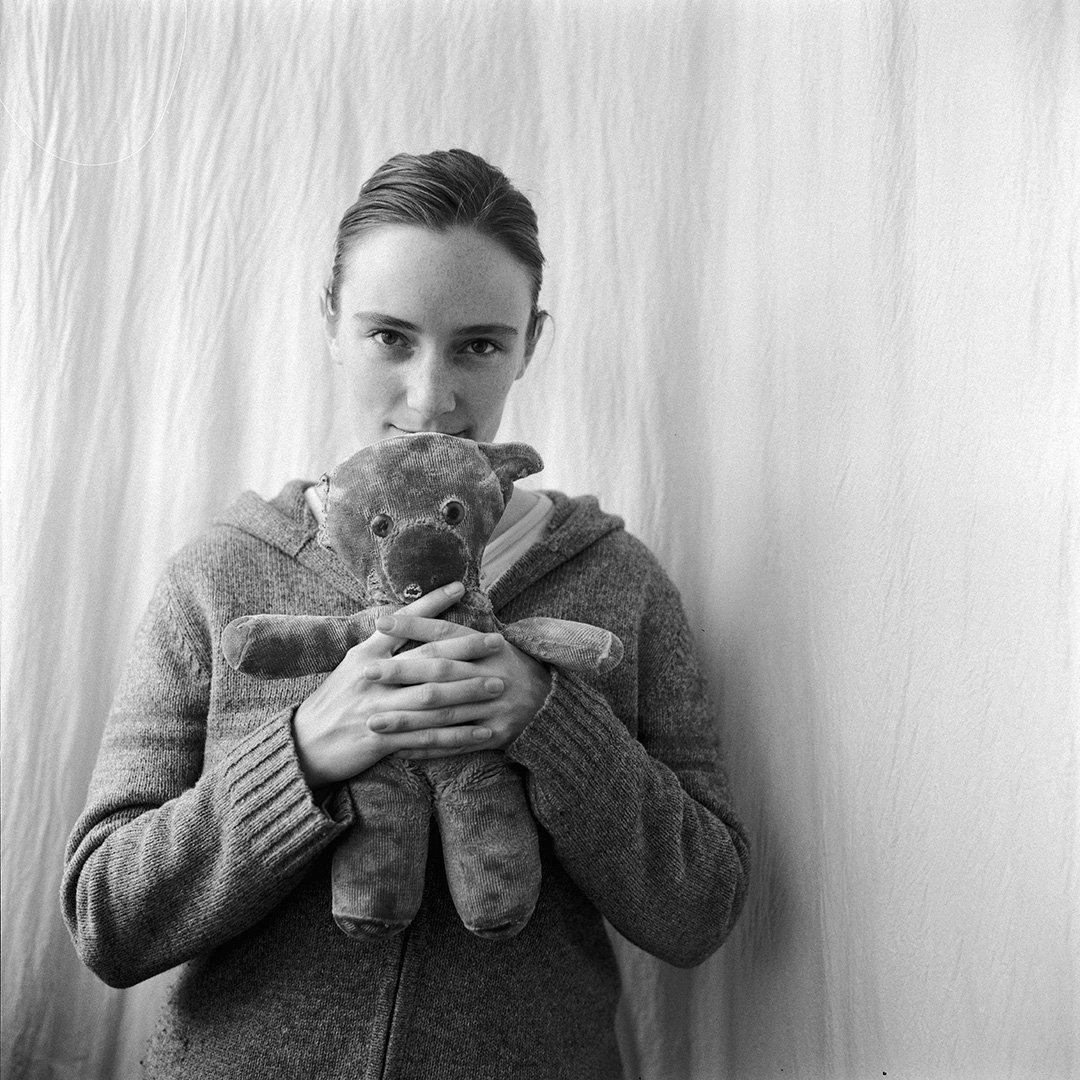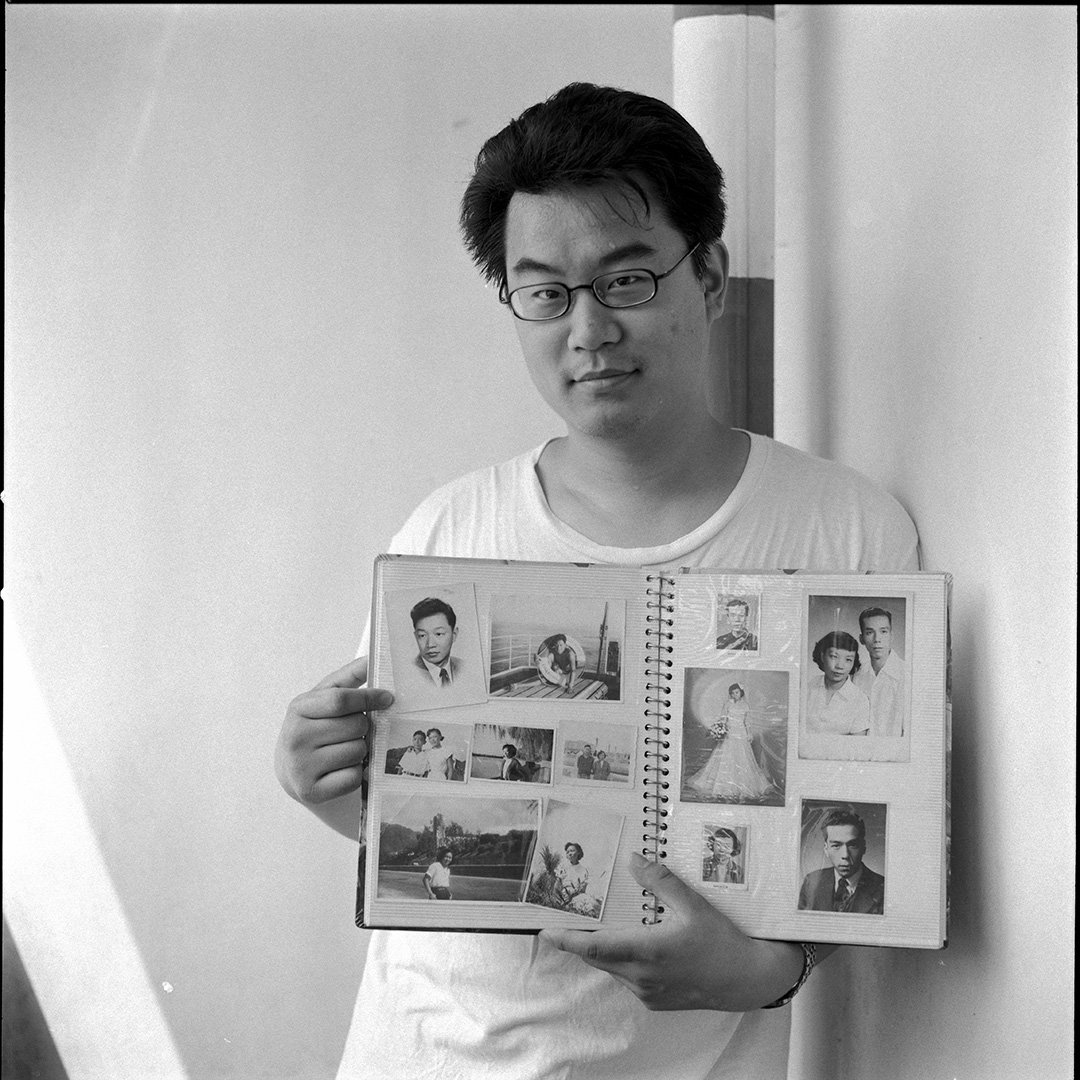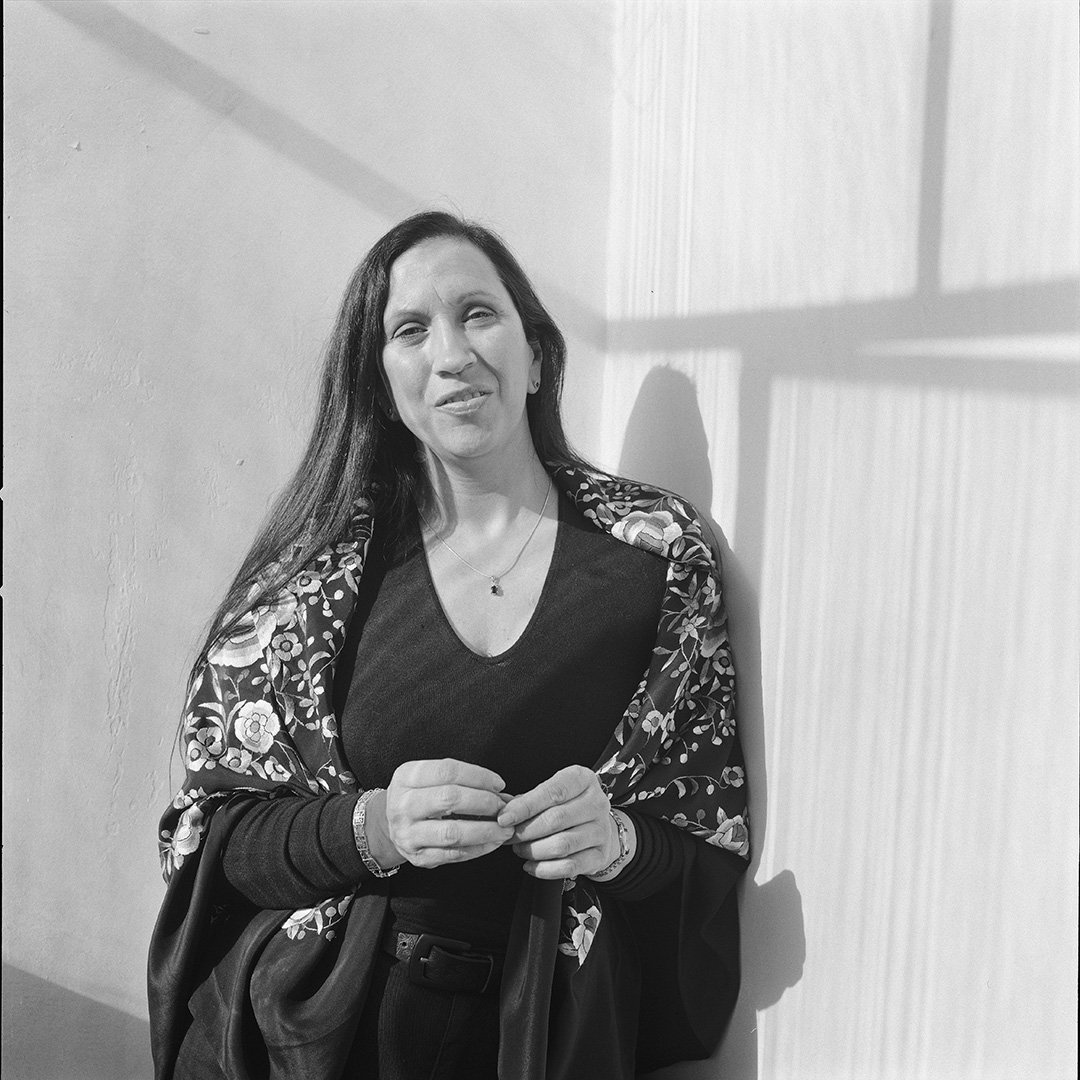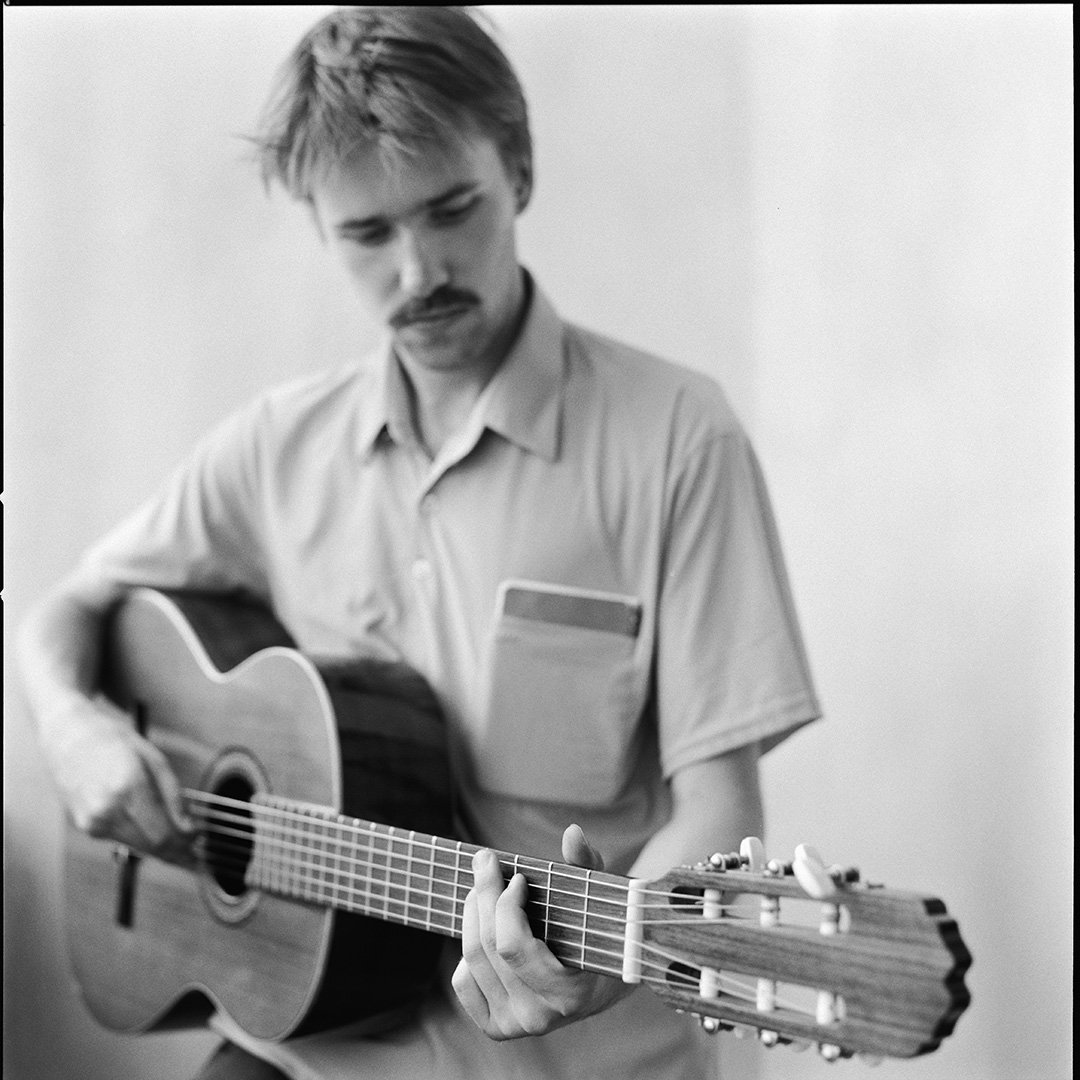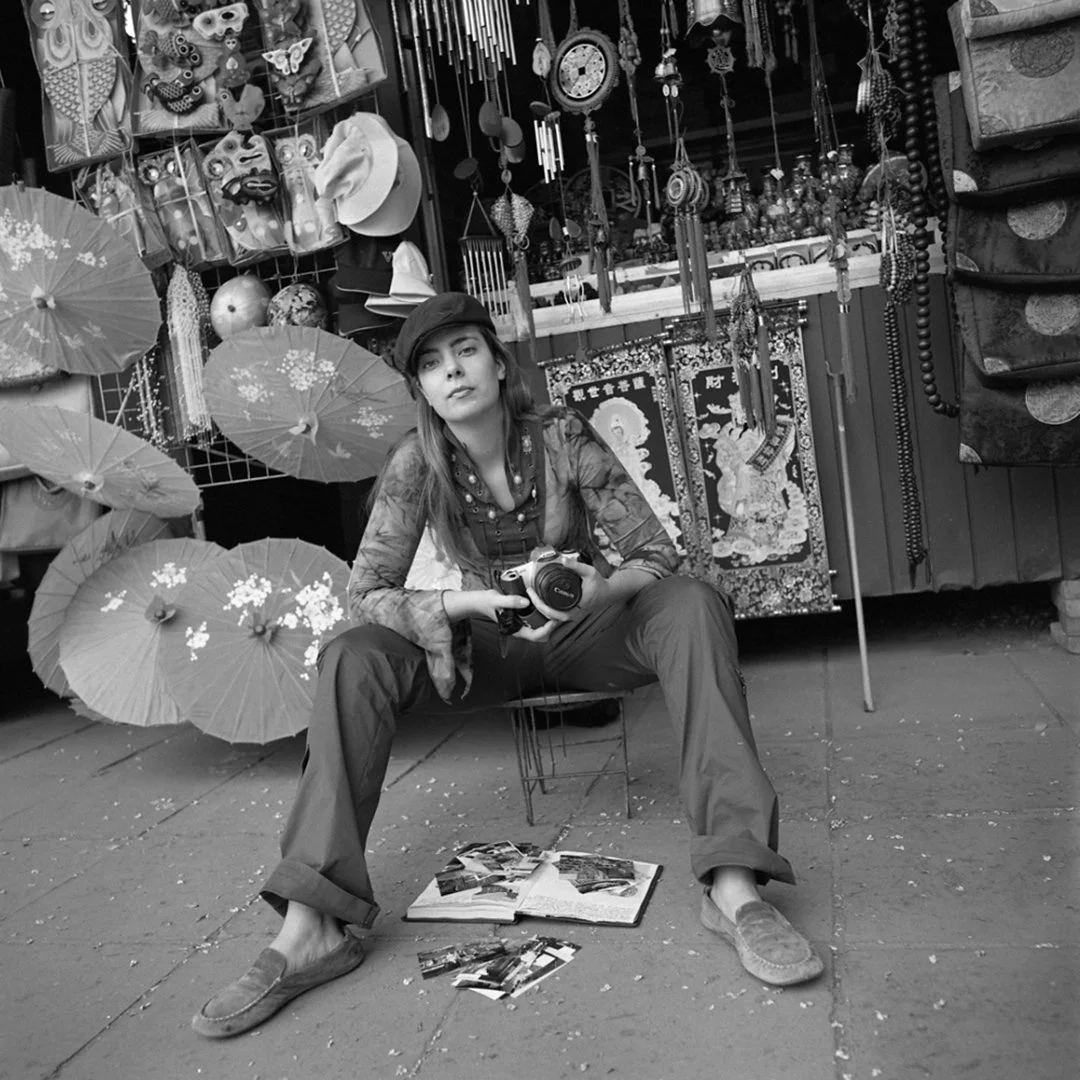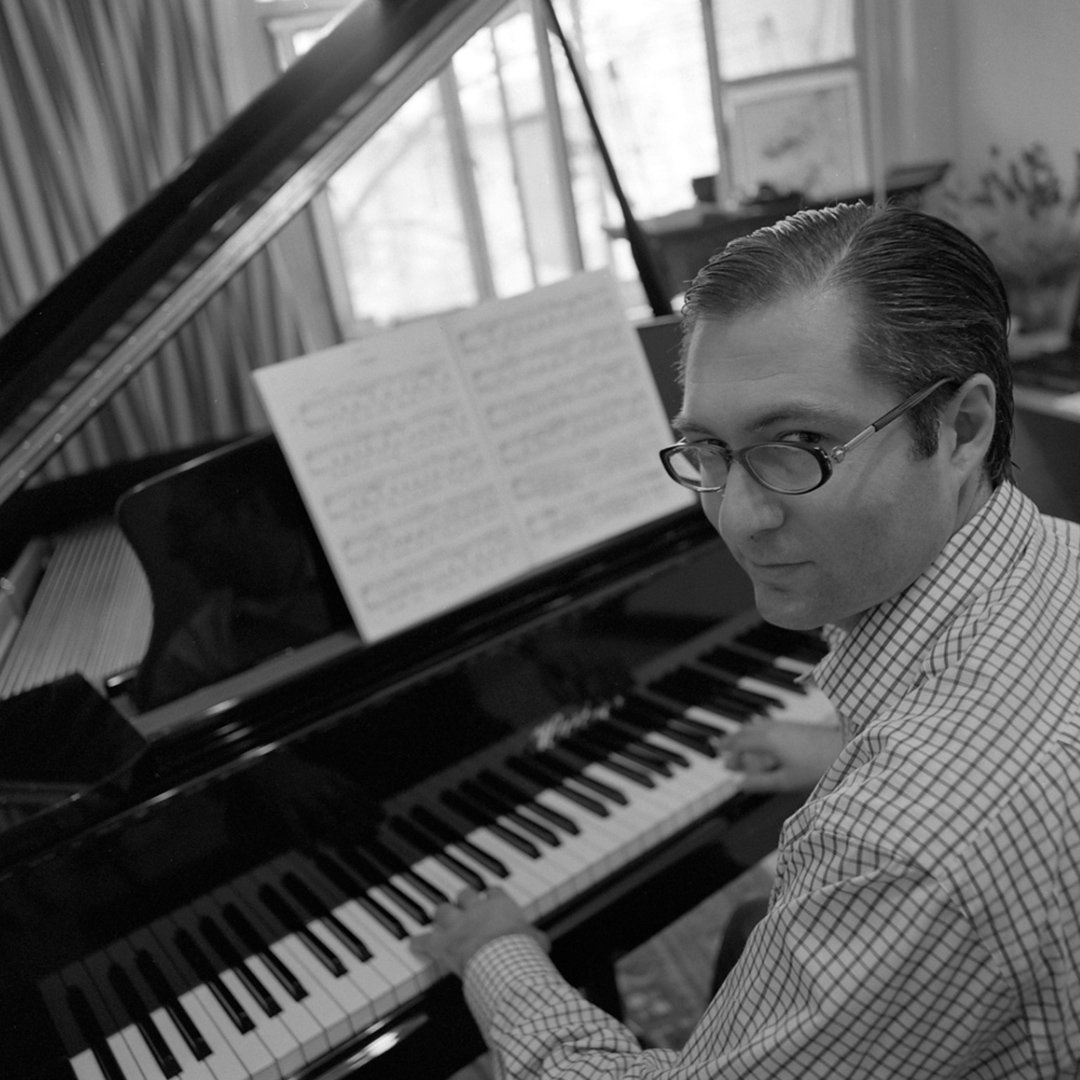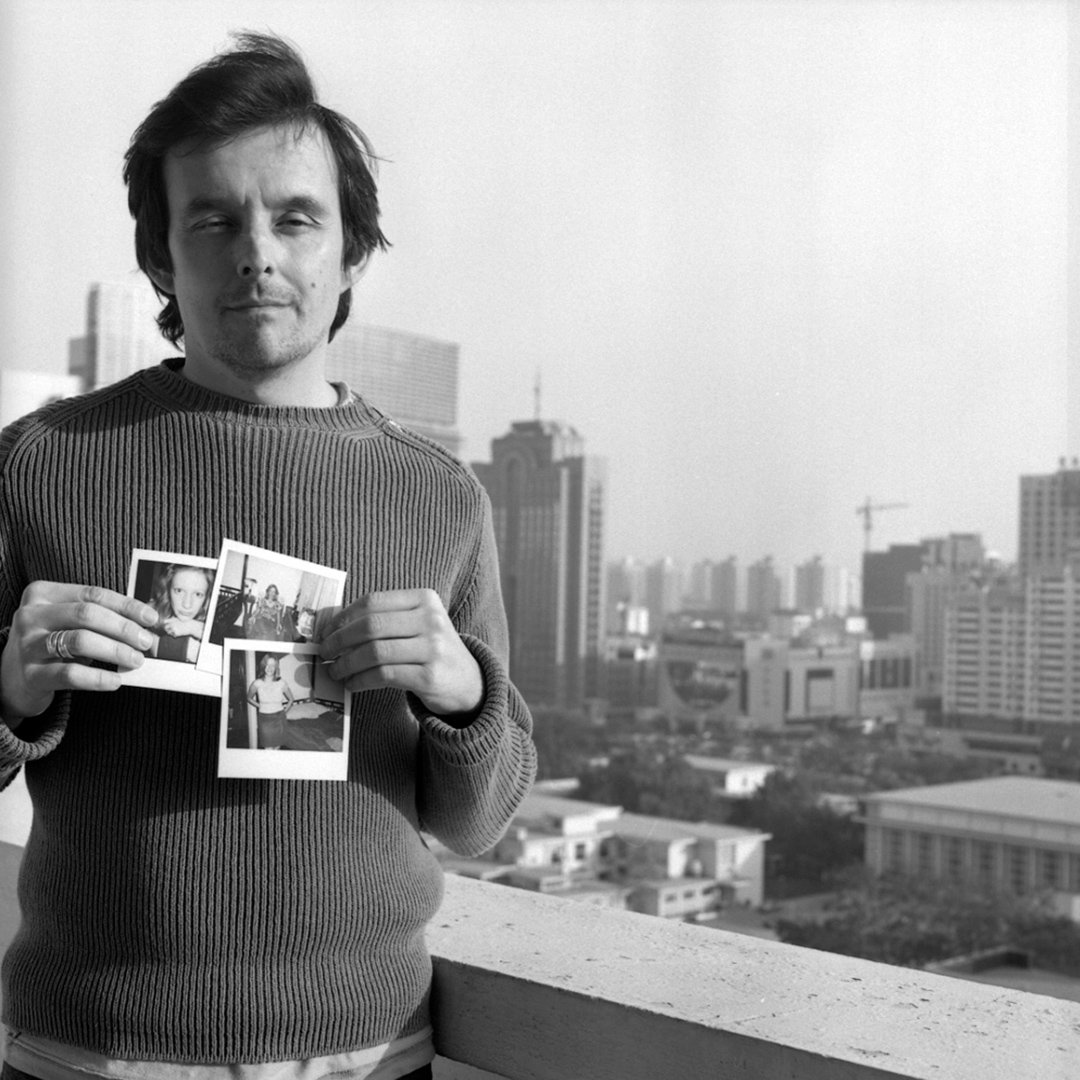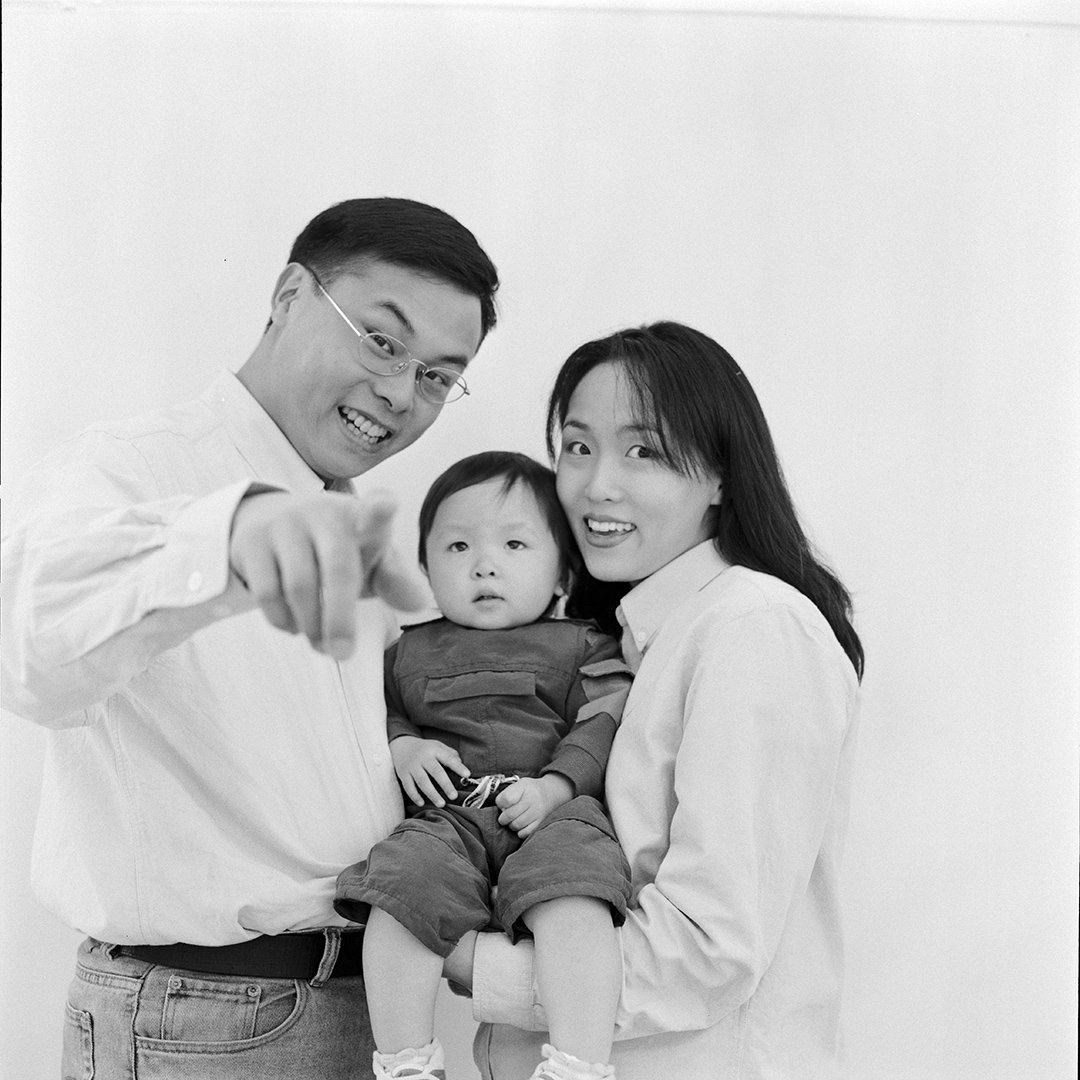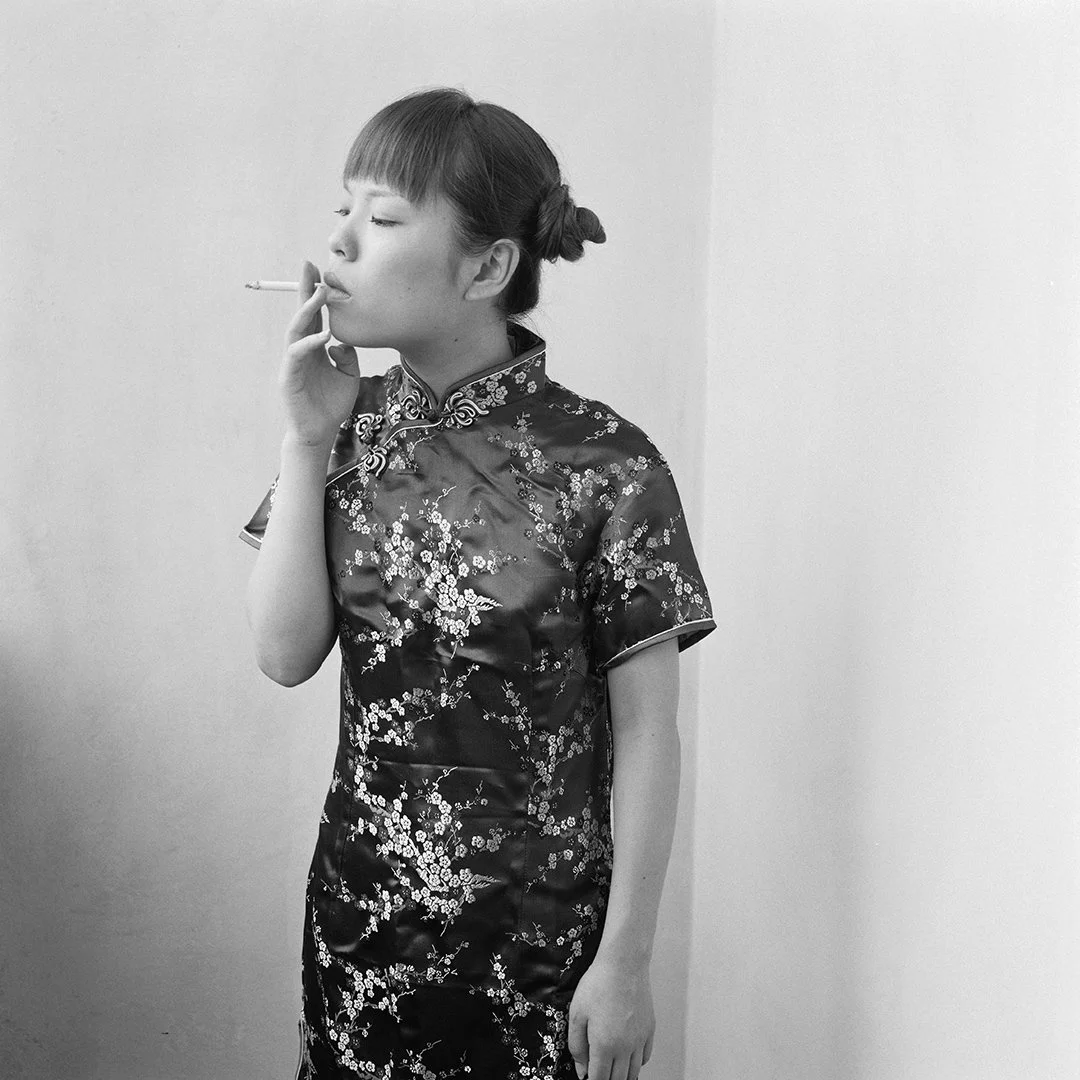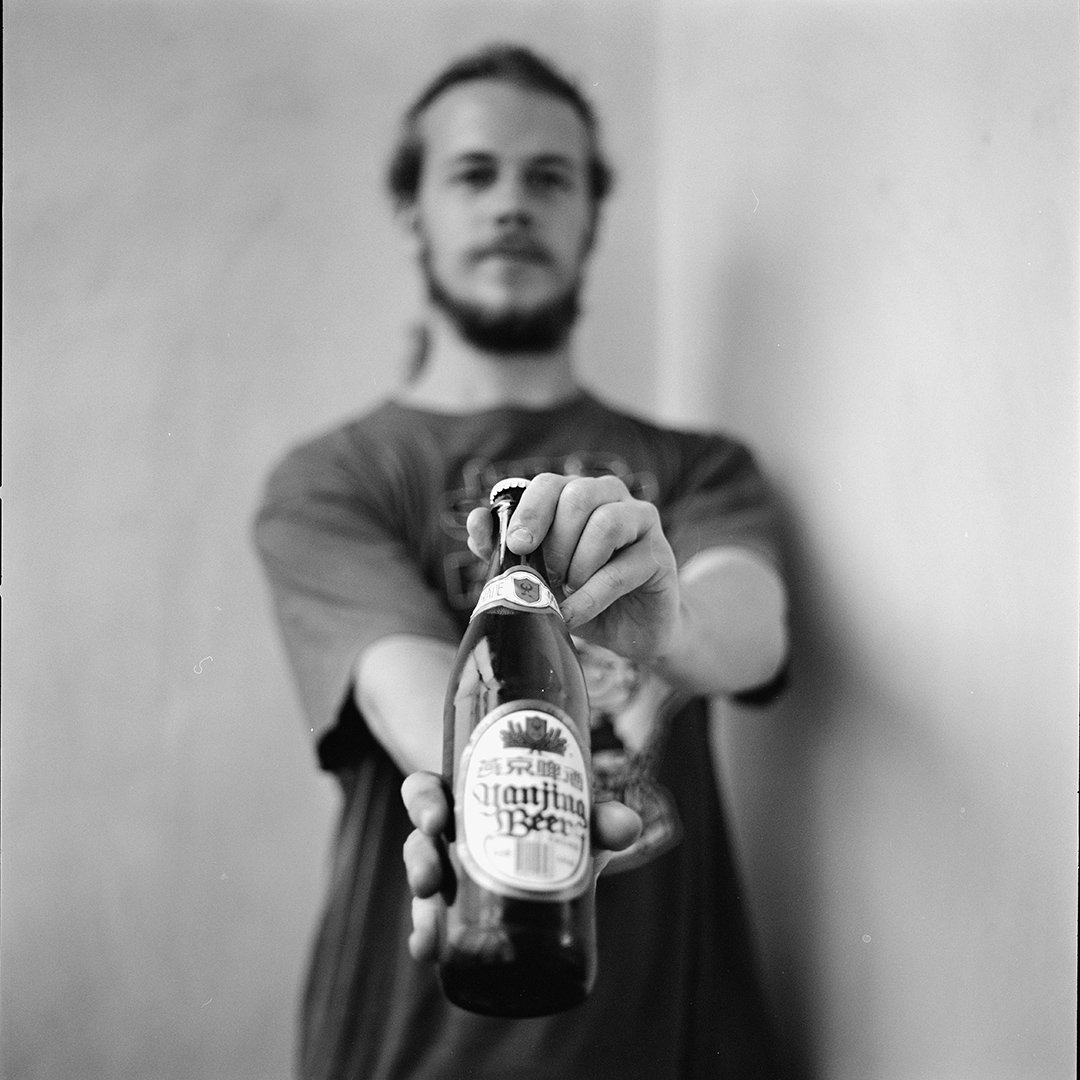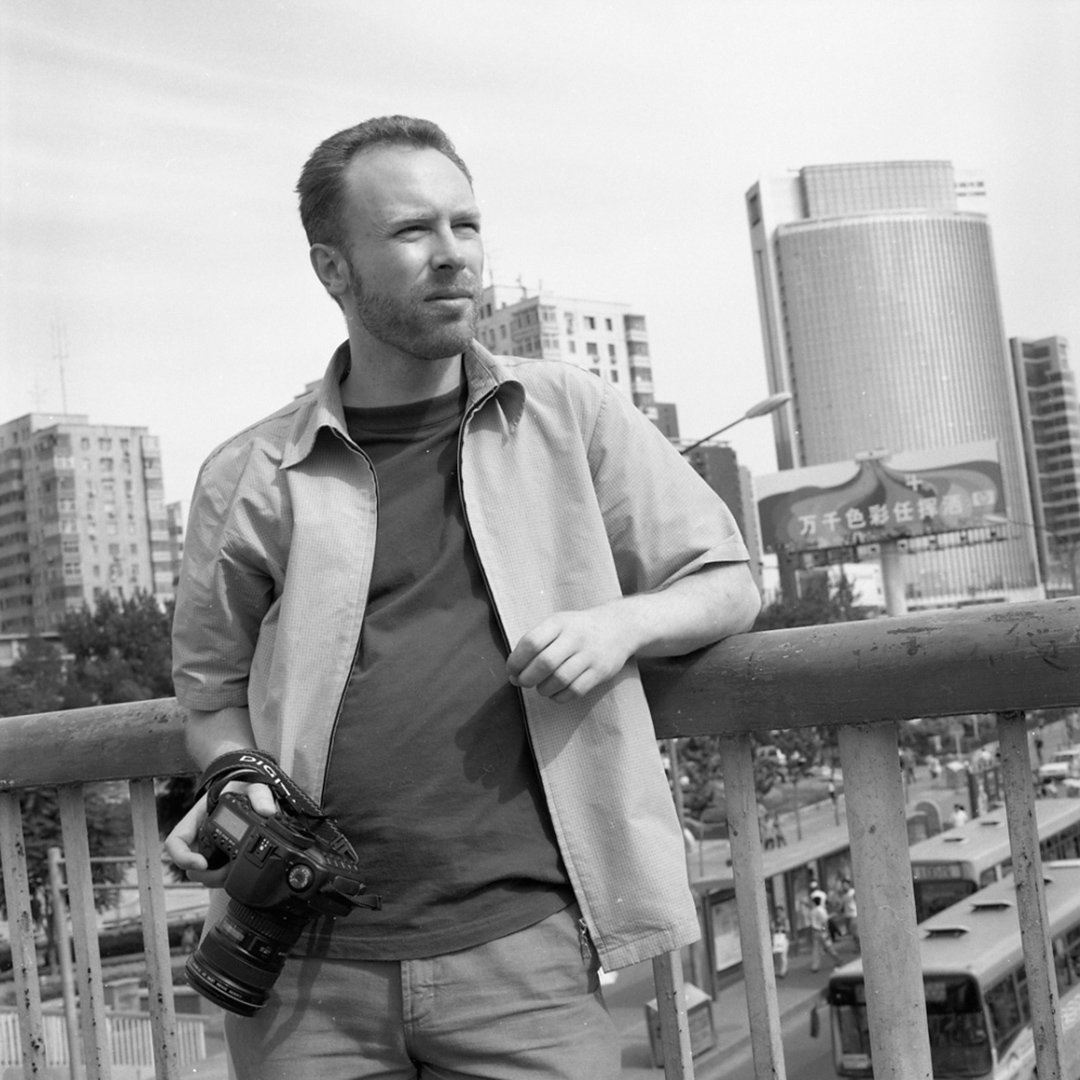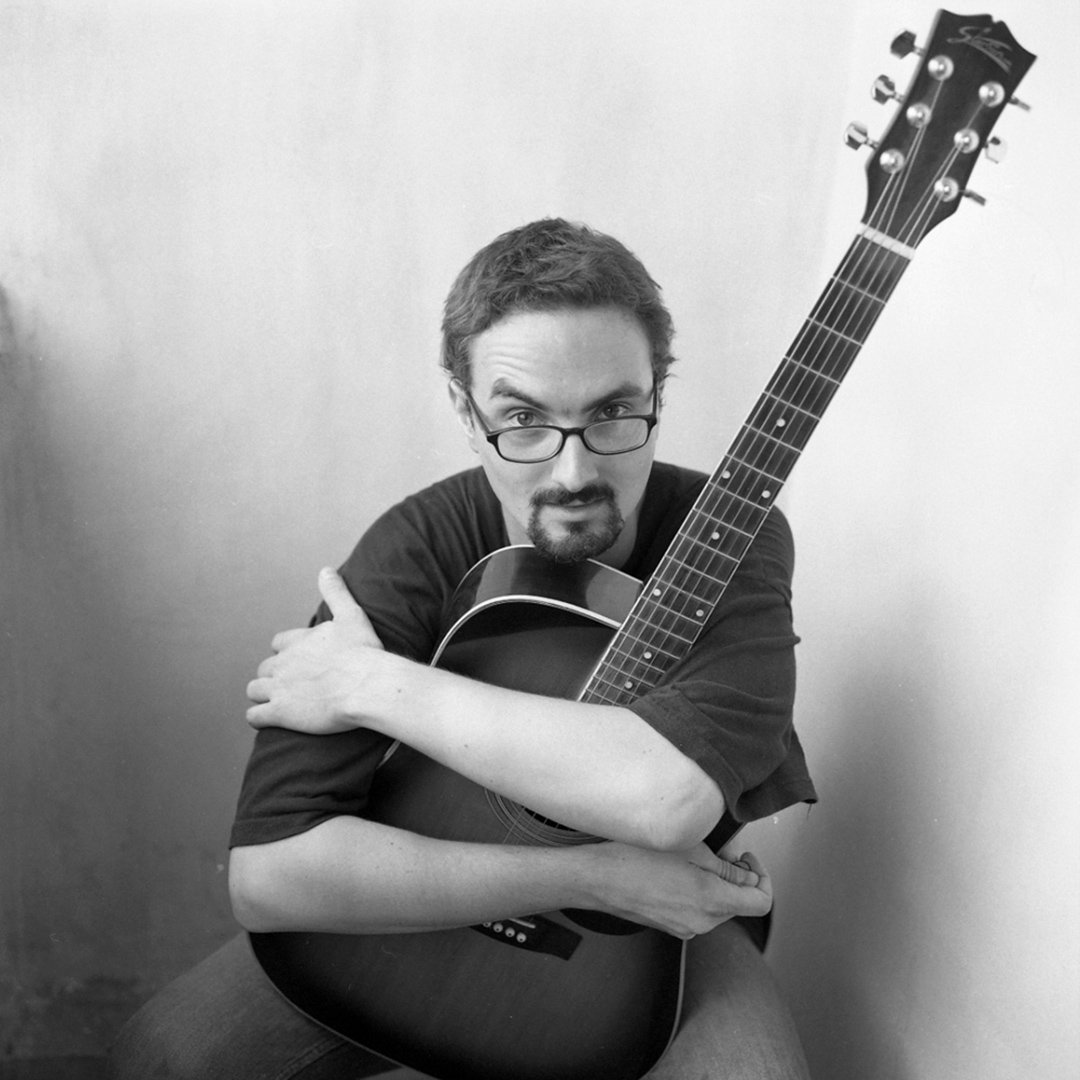Beijing Station
“Participants were photographed using black/white, 120mm film in a surrounding of their choice. It could be either in or outdoors and did not have to be their place of residence. As a further requirement, they were to bring something to the photo that they absolutely ‘love,’ be it a person, a thing, or an expression. It could be words on a page (large enough to be seen) if a thing or a person was not available. Also, it did not have to be something that was acquired in China, it could be something that was brought from outside. If they decided to bring a person, the participant had to make sure that the person they brought was made aware of what they were getting into, and that they agreed to be included in the portrait. Lastly, participants were required to write down their reasons for choosing what they did and how they felt about being photographed.”
-
I am a young French man, and I first came to China when I was 17 because i was learning Chinese at high school. Right after graduation, i came to liuxue (be a foreign student) for one year (I was 18, in 1994-5). After coming back several times, I finally settled in Beijing, and have been here since September, 2001. I write travel guides, and write articles for some magazines about this amazing country.
I chose the sword because it is the first thing I learned in China, practicing wushu (Chinese martial arts). I practiced it for ten years. Meanwhile, i kept on studying Chinese and meeting Chinese friends. So this sword symbolizes the gradual improvement of my exchanges with the Chinese world. It's not a sword, it's a key to China!
I felt ten years of China slaying in my eyes in one second - quite a shock indeed.
Abel Segretin (France, 2001)
-
I LIKE PARAGLIDING!! Like most nerds, I’ve always dreamed about flying, especially paragliding because the thing fits in a backpack and you can fly it anywhere there’s a cliff. After college I moved to Taiwan and started teaching English and made heaps of money and bought a glider from Korea and went flying every weekend; it was dope. Then I moved to Beijing and went flying and f*&ked up and hit a tree and realized that my skills need work so now I don’t fly much. I need lessons.
I still love flying though.
(Translated from Chinese):
This is me and my paraglider. I have always wanted to fly since I was very young, and as a youngster my favorite toys had something to do with flying. So, when I grew up I bought the biggest toy! I bought the paraglider in Taiwan, and it was there that I began to fly. In Beijing I haven’t done much flying because, not only is my skill not so good, but the environment here is not as good as in Taiwan for flying. When I return to the States or Canada, I hope to continue studying how to fly, but for now I can only dream about it.
Alex Woods (Montreal, Canada/New York, USA, 2001)
-
I decided to come to Beijing for a new experience – doesn’t everyone? My life, this far, has been sheltered to say the least. For the past 21 years my home has been a small village on the outskirts of Lincoln, a city in Eastern England of just 85 000 people. On going to University I opted for a city a third of the size! I wouldn’t have changed these years for the world: great friends, a loving family and thousands of fond memories. What more could I want? Well…what I want is to experience something completely different, to see if I can cope with life’s obstacles outside of Lincolns protective walls. Beijing is such a vast city in every aspect. Population, space and culture are all so different to Lincoln. This would set me the challenge I needed. On returning to England I will train to become a teacher, so I decided to gain valuable experience teaching English to school children.
On being asked to bring something that “I love” I was set a task which although sounds somewhat simple, is far from it. There are one hundred and one people, places, objects and sayings which mean a great deal to me, but after much thought the song, “I am the one and only”, was my choice. This song is my favorite song. It never fails to cheer me up, bringing back many fabulous memories of life back in England. The line “I am the one and only and you can’t take that away from me” tells me that everyone is unique and that you should always be yourself whatever the circumstance. For every person who doesn’t like you there will be plenty who do!
The setting for the photograph had to be somewhere which emphasized the reasons for coming to Beijing – namely to experience something completely different to my life in England. Surrounded by people sums this up well, as it is a complete contrast to Lincoln, while also highlighting my feeling of being alone amongst so many people.
I am excited about the prospect of being photographed, especially as it is for the above-mentioned reasons. It sounds like a very interesting project. I enjoy photography greatly myself, so I wish Miss Patterson the best of luck.
Alistair Downs (England, 2003)
-
Tap Shoes: Never leave home without them. My tap shoes have traveled with me to temples in northern Japan, to cabarets in Harbin, China, and I even left a first aid kit at home so there would be room for them in my backpack for a three week trip around India. You never know when you may need to whip out an instrument around a campfire, in front of a crowd, or for a Maharaja. So naturally when asked to choose a possession to be with me in the photo, the first thing I thought of were my tap shoes.
I came to Beijing this time, my third time, on a Fulbright Fellowship to research the development of Modern Dance in China. My tap shoes came with me and I really ended up doing more tap dance this round than Modern Dance. Tap is slowly growing in popularity in China – tap is rhythm and music more than it is dance, and in a city as crowded and cacophonous as Beijing, I can think of no more appropriate instrument.
I chose to be photographed on a tianqiao over a busy street because my first time in Beijing in 2000, the tianqiao were one of my favorite places just to stand and watch Beijing rush by, soaking in all the noises around me: Wanbao wanbao! Beijing wanbao! Wanbao wanbao! Beijing wanbao! Shuiguo pingguo liang kuai wu! Shuiguo pingguo liang kuai wu! In 2000 mianbao che were still allowed inside the 3rd ring road, and the streaming slur of words the drivers called out to potential passengers at intersections mesmerized me and convinced me I’d be able to tap Beijinghua long before I’d ever be able to speak or understand it.
While being photographed, I wasn’t sure whether I should play to the camera as if it were my audience or just get lost in my improvising and forget about Karen and the lens so that the photos might catch parts of me I wasn’t deliberately showing off to it. I sort of alternated between one and the other, although the whole thing was over so quickly I didn’t have much time to contemplate my options. After being photographed, both Karen and I commented on our surprise that there was actually sound while I was dancing! The taps weren’t muffled by the rubber-covered walkway or drowned out by the blaring Saturday morning traffic on Gongti Beilu below us. I definitely will tap dance on a tianqiao again, trading beats with the city around me.
Alison Friedman (USA, 2003)
-
Well, I was studying mandarin in Beijing for nine months. finding it pretty dry (physically and emotionally), I was interested to find out what life was like for someone with a more creative brief. Karen said, bring along the thing you love most. I thought, if there was a fire (which was not unlikely given the frequency with which things blew up in my flat), what one thing would I reach for before running? It was the bear. I think she represented home and things
familiar, things I was desperately missing at the time. It was the first time I had shown the bear to someone I didn't know well. I felt exposed. Perhaps I needed that, in Beijing, otherwise boxed in by concrete and scaffolding.Amy Owen (UK, 2001)
-
My name is Angela, an Australian born Chinese. I came to Beijing because the company I was working with in Sydney offered me a position in this city and also I thought it would be fun to work in China again. I’m no longer with this company and I currently work as an English Examiner.
Originally I didn’t want to be photographed because I don’t like being in photos in Beijing. However my brother suggested it would be fun for me to pose in a bath tub filled with DVDs, and I ended up enjoying getting the photos taken by Karen. Why did I choose these things? Cause these things help me get over my ‘Bad China Days’.Angela Lau (Australia, 2003)
-
My name is Bobby Shih. I am in Beijing for a little over a semester of Mandarin. I saw Karen's ad in Canadians in China [web page] and thought it might be cool.
The item that I brought with me is a photo album. Although it belongs to my paternal cousin, now a Beijing resident (My father's elder sister's daughter), it contains many photos from my father's generation, photos which my father does not have and therefore I have never seen. My father grew up in Shanghai and had quite a few brothers and sisters. That generation had a lot of trials and tribulations and I am very proud of my father for what he has accomplished. He used to tell me about where he grew up and other interesting anecdotes like how my great-grandfather, a tea taster (similar to a wine taster I suppose), used to put those cricket gourds in the hallways of their home so it wouldn't be too silent; or how my grandfather, upon the conclusion of WWII, brought out a car he hid to drive in end-of-war parade in Shanghai with my father riding along; or how my grandfather paid some key money, in gold, as deposit to live in a little house in the French zone. However these were very distant images for me as someone who grew up in a different continent and culture. Seeing these photos of my father in his childhood days, youth, and adulthood made it possible for me to understand more about my father and his times.
Earlier this year I made the trip to Shanghai along with my parents and visited my uncle who remained in the city as well as the house where my father grew up (it was recently returned by the Chinese government). The photo in the upper-left corner of the left page, albeit hard to see, is my father in his merchant mariner's uniform.
Bobby Shih (Canada, 2001)
-
I decided to go to China because I wanted to experience a different culture to my own. Having grown up in Australia which, while multicultural, remains quite European in terms of the immediate environment that surrounded me, I was more attracted to the variation and difference offered by Asia. I had been to Vietnam and Thailand before and have had a long interest in China and Chinese society as a result of reading that I had done during my time at University. I also wanted to experience a different culture by living within it, as opposed to just passing through, and I knew that the demand for English in China would make living and working there possible.
During the year and a half that I spent in Beijing I taught conversational English to a variety of students ranging from 6 to 80 years of age. I taught at a couple of foreign language schools as well as a Chinese tertiary institution and found all the experiences rewarding for what they taught me about my own language as well as the native languages and experiences of my students. I also wrote regularly for some English language street press publications in Beijing and traveled to other parts of China including Haerbin, Shanghai, and Inner Mongolia. As well as that, I also reunited with an old friend, met a kindred spirit and fell in love!
For the first year of my time in Beijing I loved just about every minute. I found the stimulation of an environment in which there is always something to look at or someone to say hello to or something different to smell or taste envigorating and exciting. Learning a new language added to the challenge of day to day life and figuring out my way around that enormous metropolis was liberating. Of course, I made some very dear friends, both foreign and Chinese, who enriched the experience all the more for me. Towards the end of my time, I found myself easily frustrated by Beijing’s pollution, traffic and crowding problems whereas in the beginning I had been more patient. Problems of language also frustrated me as, although I had learned basic Chinese, it was not enough to have discussions of any depth and I found myself craving a reemersion into an English-language environment. I think those are common frustrations for any foreigner living overseas.
I love writing and find it the form in which I am best able to articulate my thoughts and emotions. During my time in China I went through 4 diaries (and hundreds of emails). That diary will always be valuable to me because of the experiences and memories that are captured within it. I don’t look back on it regularly but I know that, as memories fade and are replaced by others, I will always cherish that collection of thoughts and images that were penned during those interesting months in China.
Cath Collins (Australia, 2001)
-
My name is Cristina, I come from Spain and currently I am living in Beijing this year along working in a training job as Network Administrator. When I found this chance of working and living outside my own country I applied for an Asia city because I have always been interesting in the Asia experience. I am curious about the way of thinking, living, eating, about the eastern point of view. And that is the
reason I feel really glad of being here in Beijing.This city is for me both sides: a look into the pass times and the changes of the modern life. Furthermore, Beijingers are so talkative, so kind, so open and curious about me, about everybody, that I don’t really feel out of place. I thought that Beijing would be a stressful place but on the contrary, I like this city very much, it is a really nice place for living.
I like the way that people enjoy the city: walking, playing in the streets, doing exercises everywhere.My flatmate and me chose our little cat called PEACE (Heping in Chinese) because he is the first gift that Beijing gave us, and he make us feeling as if we have a truly home. He is the sweetest company that you could ever met when you come back home from work. And of course he is an important part of our lives here. And, well, we chose this location for the pictures
because it is a common place for us. We see them everyday, and we use to go there for shopping, or repairing our bicycles. And I really think that is a very representative place for what I see and what I live everyday here in Beijing. I like this kind of places, I love life of the Chinese streets.Cristina Escalante (Spain, 2003)
-
(translated from Mandarin Chinese)
I came to Beijing in order to continue my studies in Chinese. I have studied Chinese for about 6 years, the first 4 years being in Canada, and the last 2 years have been all in Beijing, China. You could say I am a fan of Mandarin Chinese, but I am not sure why. Perhaps it is because I feel that it is very pure, the most perfect way of expression is also the hardest form of language.The reason why I came to Beijing is not as significant as why I stayed here. Up until now I have written 25 or more pieces of writing. Flipping through the pages of the notebook I can see the progress I have made over the years studying Chinese. I observe that my writing is more and more like that of a Chinese persons, and that the way I use the language to express myself has improved a lot。I often put down in writing a lot of interesting life experiences and thoughts about my life, especially as they relate to the changes in the degree and depth of understanding I have of China and Chinese people.
When Karen took photos of me, I felt a little nervous. I was thinking whether or not the photograph would be able to accurately reflect the feeling of having studied Chinese for 6 years?
Danielle Girardi (Canada, 2001)
-
I am Deborah Tchoudjinoff, a French citizen with a mother from Taiwan and a father with a Mongolian bloodline. I do not distinguish a certain country to my identity because like me, the majority of students that I graduated with are considered ‘third culture kids’. I have just recently graduated from the International School of Beijing, and will be preparing to leave for Philadelphia in August to attend Art University there; hence my natural curiosity towards art events happening in China.
This is my last summer in Beijing, a city that has been a home to me for the past six years. So, as my last sort of “final” celebration in Beijing I decided to pick up the recent editions of Metro, that’s Beijing mags and found Karen Patterson’s advertisement. I was immediately appealed to the idea and emailed to find out more information. I was even more encouraged to find beautiful black and white photographs of people on her website; foreign and local. Karen had told me that I was to pick a certain location and a particular someone/something that is most precious to me for the photograph.
I chose my ‘soul mate’ if you will, Gabriella. A beautiful Swedish-Finnish, who has played a huge role in making Beijing a city that I will always consider a home. I had picked a café in Houhai as the location, because it would be the first time both Gabriella and I would be there. This is symbolic in a way that it shows our experience with new things together. These new experiences work as the glue that holds our friendship.
I love photography. Photographs have the ability to capture a certain moment, and give others a chance to experience it. The best part is that it allows diverse interpretations. To be part of that was thrilling, to be something others will view and interpret their own way is even more exciting. I think photographs serve a much deeper purpose than memory. It’s a visual expression in substitution for words unsaid.
I felt extremely comfortable working with Karen, because she encouraged natural behavior. I didn’t feel like I was on the spot. I liked being able to interact with my surroundings, manipulate things around me; it made more sense for me that way. It also helped to know that I was part of a project for Karen to better understand the unique characteristics of an environment that only Beijing could offer.
Deborah Tchoudjinoff (France, 2003)
-
(A.K.A. Chucky the Queer, Master Decoy, Wonder Bread, Stupide, Slacker, Elf Lover)
Serial Number: 69
Made in: Backseat of a K-car near Hull, Quebec, Canada
Years sentenced in China: 2 and counting
Occupation: Resembles teaching computer graphics
Why did I choose my brother? He’s my brother!! Because he was the only one available at the time. I seem to have misplaced my skateboard. Circumstances really …
Why did I decide to go “work” in China: I still don’t know …
Bad personality traits: I don’t have one
Good personality traits: I don’t have one … I shower every day!
Are you always unserious? Yes
Why? It helps hide my shady past …
Shady past? You ask too many questions … go away!Note: if I forget anything or you think I am just being idiotic, tell me, and I’ll change.
Dominic Turcotte (Montreal, Canada, 2002)
-
I am Elizabeth Chen, a 10-year old kid who goes to fourth grade in Beijing. My Dad works here, so we moved to Beijing from Tokyo.
Biscuit is our golden retriever that we "rescued". He had been badly treated. No matter where we move, we will always take our dog. No matter how silly he can be, I will always love him. My sister Christie joined in the picture because she can be a pain sometimes by tagging along to my activities.
How did I feel? Awesome! I love having my picture taken and I feel comfortable in front of the camera. But I was a bit worried that Biscuit wouldn't cooperate. He is afraid of sudden noises and flashes. I was also afraid that my sister might do "bunny ears" on the dog and ruin the picture. I also felt a bit cold. We were outside in the middle of winter and I didn't have my jacket on. But all in all, I felt important, like a movie star!
Elizabeth Chen (USA, 2003)
-
I was in Beijing to continue an art/life project Standard II consisting of 197 performance-meetings within a period of 4 or 5 years. While living Beijing for almost 2 weeks, I did 12 of these meeting-performances. The old hutong was in the process of being demolished, and I liked this door with its traditional principle, but modern construction method (70’s mood) in the middle of these ruins. This neighborhood in destruction, like every other object in destruction, represents for me an interesting and essential aspect of human life (although we sometimes do not want to accept that aspect of life or even think about it). I decided to bring the pillow because the state of sleep is one of the best states for reflection and involuntary, mysterious distortions of the mind. I really love to sleep, so I love my pillow. I also brought the book about my art/life Standard II project that I have been carrying everywhere with me. I love this book because its pages are empty – only white pages without any visible writing - and this book has been following me everywhere I go in the world for the last three years. I felt sleepy and good, as I had my pillow, and even though the ground was dusty and dirty, it was actually quite comfortable to sleep on. The act of sleeping helped me to forget about everything, and so for some time I was not even aware of being photographed.
Eric Letourneau (Quebec, Canada, 2003)
-
Gary, thirty-two, married, from England and currently a furniture salesman / project manager. Of living in China; I've been here for just over four years and I like the ever-present feeling of struggle (in the sense that even the smallest of things require some effort to be realized, not in the sense of my circumstances being difficult, because they really are not). I originally came to China to do some academic research (which I never even started), and decided then that this was as good a place to live as any. In fact, if I wasn't here doing this I'd only be somewhere else busy with other things. I've always thought that where-ever you go you're still you. And damn good job too. The book and material were chosen because they were to hand. I like the book because it has a beautiful cover, and contains some interesting short poems from India, long ago. It's nothing that I should be able to relate to in itself, but at the same time I suppose it's by oldest possession in China, which I brought out with me from England when I first came here; so perhaps it has some vague importance. The material is a nice design and has good colours. I like being photographed, it's an attention seeking thing I suppose. When you took my photo I liked that quite a lot actually because it didn't seem to take up too much time, and yet seemed very professional all the same. Thankyou very much we enjoyed it.
Gary McGuiness (England, 2002)
-
My name is Gisele Lewis. I teach French at the International School of Beijing.
I had been teaching in Canada for several years but became disillusioned about teaching in Ontario for several reasons. After a 2-week strike I felt I needed to seek out new horizons. I decided to go teach overseas. I attended job fairs for international educators and my goal was to find a position in Europe somewhere. My job search for European possibilities at these fairs had not been successful and I was about to start another school year in Ontario when I received an email about a position in Beijing.
I immediately thought: “China!!”, I don’t want to go to China. What will I do there?
I wanted to work overseas but China seemed like such a big change. At first I didn’t even answer the email but then I figured why not. ISB needed to fill a position urgently and I was offered a position after a phone interview. Three weeks later I was teaching in Beijing.
China turned out to be nothing like I thought it would be, now, I wouldn’t want to be anywhere else but in Asia. I have been in China for 3 1/2 years, I feel very much at home here.
I was photographed with a Chinese shawl which I purchased shortly after moving to Beijing. It is a delicate black silk embroidered shawl. It reflects China where I feel at home now.
I answered her [Karen’s} request for subjects to pose for her after I read an email for Canadians in China. I thought this would be a fun thing to do and I was right. Karen is very open and warm. I was happy to meet her.
Gisele Lewis (Quebec, Canada, 2001)
-
I’m Jason from NC, USA. I’ve been here in Beijing for about a year being a bum, traveling and miseducating the Chinese. I chose movies because they’re a constant and do matter where in the world I am, they stay the same and keep me sane. I enjoyed having my picture taken, because I like people to look at me!
-
Tach, I’m Jens from Germany, 23 years old.
Why have I chosen my trombone?
I just love her! (trombone is female in German). I’ve spent so much time with playing trombone. I had so much fun - I’ll still have. I’ve put so much effort in learning this instrument and every minute was worth it.
I think I have the same relationship with Beijing. I came to study Mandarin. I put a lot of effort in it and I loved it. I just love Beijing.
Jens Hildebrandt (Germany, 2001)
-
I am not sure where to start, probably because I am not so sure how I got here in the first place. I guess it all started a long time ago, in a land far away, but I will not bore you with the all details. Basically I am a diplo-brat I follow my parents who are diplomats on their adventures to better the world. But really all that matters is that I am here now. And I have a guitar. And by trying to be as different as I could be, a studded leather jacket and a Mohawk. But that is not really too different is it? I really cannot explain why. I suppose it is because I was a dork and a loser for much of my life, and I saw the guitar as a way to be cool, and different, and China the place to do it at. And when I am on stage, playing guitar, I feel my true self come out. At any rate, I have loved music and China ever since I was born, when I could barely speak I was already going with him to his weekly private Chinese classes, I could use chopsticks before my parents let me use a knife and I could always speak a little Chinese, mostly to make the waitresses at Chinese restaurants think I am cute and give me free fortune cookies. As for music, it has also been with me for a long time. One of my uncles plays trumpet in bands since the 70’s and his brother was a bassist when he was a rocker in the 80’s. I have played trumpet since I was in the fifth grade myself. I now realize, that I am this way not to get attention (I get enough being white) but that this is who I am. I am and individual, I am different and I am happy.
To me, being photographed isn’t a big deal; even with my hair not spiked up I am asked to take pictures with random people. At punk shows there are always photographers flashing away at the tall laowai with the funny clothes and strange hair. However, being instructed on how to pose was a new thing for me. Overall, it was a great experience I was glad to take part in, it gave me a chance to show myself off once more and this time allow me to give my reasons. THIS IS WHO I AM.
Jeph Marquardt (USA, 2002)
-
I belong to a rare breed of Overseas Americans which have been raised in Asia. By cultural inheritance, I am an American. However, I have spent 22 years in Asia, and only 7 in the United States, my so-called homeland.
Both my parents are Children of United States Navy personnel who were based in Japan in the 50's and 60's, due to the large American Military build-up after World War II and during the Korean War. My parents have an almost Asian-style arranged introduction by fellow Navy personnel in the early 60's - in Yokohama, Japan. My older sister and I were both born in Yokohama, myself in the U.S. Military Hospital.
My father had come to Japan in search of excitement at the age of 22. He had just graduated college in California, and had been awed by Japan during an earlier summertime visit by Cruise Ship in 1960. At the youthful age of 25, he single-handedly founded the Crown Worldwide Group - which he has grown over the last 37 years into one of the largest privately owned Relocation and Transport companies in the world, hosting an empire-like presence of offices, from Sidney to Johannesburg to Paris to Calgary to Buenos Aires.
A witness of 12 years of British Colonialism in Hong Kong as a
schoolboy, I attended a British School in Hong Kong in my primary studying and then later the International School System for 6 years. As a 16 year old American having lived my entire life in Japan and Hong Kong, I was sent to Boarding School in America. Once there, I faced a culture shock not only as an American who had never lived in America, but as a teenager who did not fit in to either American or Asian-American societies. I was able to adapt to the new environment quickly, however, due to the mixed cultural lifestyle I had experienced growing up in British Hong Kong, where I had learned to get along with all types of people.I continued my education in America into University, where I left the old American East Coast for the California Beaches. Upon receiving my diploma in Santa Barbara, California, I was ready to return to Asia. I missed the exciting and fast-paced life I had remembered in the Far East, and sought a place where I could blend in better with my Eurasian background.
My father had sent me back to Hong Kong or Shanghai to work for the summers while I had been studying in the U.S., so my first choice was to move to Shanghai (1996), as the city possessed the same dynamics and emerging city feeling as I has remembered seeing in Hong Kong when I was a young boy. Few foreigners were living in Shanghai at that time, and I received Hollywood-style treatment as a young American man who could speak Chinese, both Mandarin and Cantonese. My maternal grandfather had lived in Shanghai in the late 1930's and early 40's, so I did have some family history in the city. My grandfather, who is still alive, still has many memories and some great stories about Shanghai in the 30's.
I have since remained in China over the last 7 years, having lived in Shanghai (2 years), Tianjin (1 year), Shenzhen (1 year), and Beijing (3 years). I have spent all 7 years in the transport industry, the last 4 of which have been spent at my father's company.
My Harley-Davidson Motorcycle was chosen for the photography because it is something that is beautiful and that I love. I have ridden and enjoyed Motorcycles for the last 9 years. My Motorcycle is only one of two bikes that I keep here in Beijing. I wanted to have a very specific Chinese background because it illustrates the character of Beijing and the blend of an American Motorcycle with a Chinese background illustrated my own Eurasian composition, which is spiritual and not physical.
I felt proud to be photographed, together with something that I enjoy and appreciate - namely my Motorcycle. One of the things I liked about being photographed was that the subject of the pictures capture my own lifestyle in China, as well as my own personal feelings towards Asia and myself, within a snapshot.
Jimmy Thompson (Hong Kong/USA, 2003)
-
This is my stuff: a CD. It’s a CD that my band, Wood (Wu De – perhaps not the greatest name, but it’s our name). The making of this cd is more than just an accomplishment that I’m proud of; it also represents the journey that I’ve made with the band, which has made for some of the most “interesting” experiences I’ve ever had:
Our first gig: playing “Jazz-Funk-Rock” in the Oak Club (since demolished), opening for bands running the gamut from Death Metal to “Pop” Metal and all points in between. Six months later playing at Happy Paradise with the same crew.
After a set of pop tunes from a duo of synthesizer + female vocals at Carborator Bar, taking the stage for four songs. Following us, a manly, blond-wigged Chinese woman proceeded to do a striptease.
Checking our a potential gig in a dance hall located 2 stories underground somewhere in Asian Games Village. (We declined).
Finding out that sometimes all it takes to score a gig is using pidgin Chinese to talk to the bar owner.
Being assured a gig every Saturday night in April at the Friend Bar, only to find out at the end of March that the bar had closed its doors.After managing to get a spot on the lineup at the Xidan Culture Square’s Summer Concert Series, our planned appearance was cancelled due to weather. We were to play the next day, but sometime between the sound check and the start of the show, the police came in and shut down the event.
Recording an appearance on the TV show LIVE NOW. Seeing us on TV. Seeing our photos in a local magazine after playing at their party.The dozens of super cool (and not so cool!) musicians/music related folk I’ve met along the way. Witnessing 1st hand what’s going on in the Beijing music scene. And much more…
Jon Campbell (Canada, 2001)
-
My name is Kaiser Kuo, and I'm a freelance writer for various publications and guitarist of the Beijing-based rock band Spring & Autumn. I was born in upstate New York and grew up there and in Tucson, Arizona, but I've been living in Beijing continuously now since the fall of 1996, with another 18 months--a summer here and there, a year studying in the late 80s--as far back as 1981. In my years here I've grown irretrievably attached to Beijing, and through my various published musings have even earned something of a reputation as a cheerleader for the city. If asked to reduce my reasons for being here to one basic element, I would attribute it to my addiction to the pace of change here--a constant feeling of newness and attendant sense of possibility hard to find in any other major world city. Plus there's the food, and a really fun rock music scene.
The computer I'm clutching is my trusty Sony Vaio. In it are many things dear to me: my digital family photo album, about 10 gigabytes worth of MP3s covering much of the music I love, recorded interviews with some fascinating individuals, my own musical compositions, and just about everything I've written--abortive novels and screenplays, passionate love letters, sordid journal entries and a wide array of essays and articles--since I finished college 15 years ago. I'd grab it before anything--even my guitar--were my apartment, God forbid, ever to catch fire.
Kaiser Kuo (USA, 2003)
-
My name is Kajo Stelter, I was born in Munich, Germany and came to Beijing in 2001 to study Chinese at the Language University for one semester.
I chose this hat to be photographed with because I collect hats and this one was made for me by my grandmother, therefore it is especially dear to my heart.
That’s it. I wish you good luck with your future art projects (and am very thankful for the picture you made of me, it is the best photo that exists of me, it has its place in my parents house livingroom) and we might see you sometime again in Beijing.
Greetings.
Kajo Stelter (Germany, 2001)
-
My Chinese name is Mi Kailin. I am in Germany studying Chinese and politics. So, in order to see if I would actually like China and to improve my Chinese language abilities, I came to study for one year in China. Beijing is China’s political capital, not only is it have Chinese style, but also has Western style coffee bars, so I came here to study.
Drinking coffee is one of my hobbies. The cup that Iam holding is my very favorite cup to drink coffee, and so I decided to bring it with me to be photographed. My other hobbies include art, and especially since being in China I have taken up calligraphy.
Katrin Muller (Germany, 2001)
-
I was in Beijing making a video project about art workers during February and March, 2004. It took me a few goes before I caught one of these buses, the No. 30 to Dashanzi. Perhaps it’s the best bus experience ever. A system completely obvious and logical. You wave the bus down when you want to get on, and yell out when you want to jump off. There are several bus routes in Beijing that are serviced by mini buses, apparently there used to be more. The buses slow down as they approach a bus stop and the guy opens the door, or slides the window across, and yells in a mono tone voice a list of streets.
Living in Australia, people have become quietly accepting of the machine. You must, in most cases now, prepay for tickets and then validate them via a machine on the bus. This means there are now no conductors to help for instance, older people or women with kids, etc., onto a bus. They call it down sizing, efficiency, progress. The last thing that this system is is efficient. So I guess I love the contact of this [Chinese bus] experience. If the bus is crowded, you get pushed on. People pass the ticket along the crowd to you. Will the changes occurring now in China stop services like this? Is it public or private? I don’t know.
When I went filming with Karen, I felt I had to be responsible, careful. Getting on and off the bus with Karen 6 months pregnant... we had to take it slow. But once we were on the first bus we waved down, Karen leapt over the conductor/ ticket seller and positioned herself right next to the driver. Then she saw a better shot so she was asking… telling people to "just move over there". I love that that thing when you are trying to get something, make a picture and all else falls aside. Karen was so much fun, and had the sequence and our story for getting on and off so many buses very sorted. We played the dumb tourists, something I know I have done several times without wanting to. I think this project is a very honest approach to living in Beijing, coming from another place.
Kylie Wilkinson (Australia, 2004)
-
As an artist working between the disciplines of sculpture and interaction design, I am drawn to the dynamic structures, systems and environments of Beijing. The tensions between order and chaos, present and past, make Beijing one of the most interesting places in the world today. Beijing is the future. Living in China allows me to peer over the edge of today and to imagine tomorrow. The vast web of micro economies and human relationships, the millions among the ‘floating population’ who gravitate to construction sites in growing cities to build the new China by means of their hand labor and their human capital, and the bewilderingly fast pace of change for the sake of itself. These are the phenomena that drive my research. People and their relationships to objects, systems and economies can be seen as human knowledge embodied in the urban fabric. How this knowledge gets lost, modified or extended is a dominant dialogue in China right now. Amidst the forces of globalization there is much to learn from China’s living culture, as this country will lead the world in redefining the very concept of progress itself, in a way that differs from the Western Enlightenment model.
Living in Beijing places me between cultures in a space lost in translation in order to understand the contemporary world in my own way. To be inside yet outside, forever between, in this awful magnificent place in time and space. The contemporary urban condition of Beijing and its changes are at once exquisitely beautiful and terrifying to witness. The strength of Chinese urban planning is summed up in its elegant division of spaces and boundaries. Current preservation issues withstanding, the generous delimitation of streets and spaces in Beijing gives the city an ancient feeling.
I chose to be photographed on a stretch of Jingshun Lu at the point of intersection with Siyuan Qiao, the Fourth Ring Road cloverleaf. Due to the rapid speed of development, there are two different visual logics at work simultaneously in this place. I watched this past summer as this highway intersection was updated. The elegant lines of birch trees now alternate with thousands of hi-tech metal streetlights that give off an unreal blue glow at night. Being photographed in this visually demanding place amongst the enormous flow of people, traffic and goods representing just a fraction of Beijing’s traffic, felt like being an ant in a colony. Beijing is like an open wound, still healing, still unresolved, like me. Sometimes, I suffer a kind of amnesia, waking to think, how did I come to be in China? What does all this have to do with me? Yet I remain drawn to the spaces of contradiction and possibility here.
Lisa Norton (USA, 2004)
-
My name is Liz and I am a British diplomat working in Beijing. At the time this photo was taken I was studying Chinese at Beijing Normal University - part of the training I needed for the job. I chose to be photographed with the 2000 edition of the Lonely Plant guide to China because I thought the book was a good symbol for the process of discovering China that I was going through. At that time, traveling in China kept me sane and reminded me why I chose to move to the other side of the world. I felt awkward about being captured on camera, but was distracted by the aesthetic of the residential area where the photo was taken.
Elizabeth Wilson (England, 2002)
-
I am not used to being in front of the camera? I am more commonly seen behind it, but sometimes life puts you in places you never expected to be. Like China. Standing where I am, the line of coincidences that has lead me to my present seems perfect and inevitable, but I know only too well that all is in fact chaos and the life I have constructed for myself is no more than a product of my own needs. Being a foreigner, especially China, which is a confusing mass of a place undergoing constant and rapid change, makes this only more obvious. For the whole of my nearly four years here, I have been unable to avoid the feeling that I am a floating element, rootless and utterly subject to change. As such, I am constantly searching for solid
ground, for a reason to be here? And I am constantly reminded that reason and solid ground do not exist.This is why I chose to have my picture taken in the ruins of some old houses in the hutong where I live. And the reason I wanted to my girlfriend Da Jun to be in the picture with me is that it is because of her that I have learnt to accept the groundlessness of life and just carry on living.
It is appropriate to have a photograph express these
meanings. A photograph captures a moment that is gone forever - as such, it is as meaningless and empty as life, which is its beauty. At the same time, a photograph is also much more - every time we take a photograph it is as if we are confirming life, stamping our feet and marking our existence, building meaning and constructing story. I have taken photos throughout my time here in China. I use my camera as a tool, not only to help me be more than I am but also to help me look more than I see. I am also trying to use it to make a living, but success in that venture might take a bit more time! As for time, it is another thing China has asked me to think a lot about. The present marked in my photo has already gone. I will soon be moving out of my home in the hutongs (I never seem to last more than six months
in one place) and I have just started a new job that has little to do with photography. Nevertheless, things from the past do continue. Like Da Jun. Because she is ever changing too.Lizi Hesling (England, 2003)
-
My name is Mark Griffiths and my main job in Beijing is working as an English examiner. I have been here for two years. I initially came here simply to have a change from Europe, though actually I have found much to be the same or similar.
I chose my passport as the thing I love because if you want to visit different places, meet different people and sample different cultures, then you have to have one. When I first went abroad alone, my father told me that all I needed to survive was money and a passport. Choosing money as the thing I love might have made me look extremely materialistic!
I enjoy being photographed. I take plenty of photos myselfMark Griffiths (England, 2002)
-
I have been a regular visitor to the People's Republic for more than several years now. Sometimes for study, sometimes for teaching but this time for holidaying! After returning to Beijing from Hong Kong where I worked as a Native English Teacher (NET), I decided to take some time out to relax, travel and play the piano.
I always wanted a grand piano. After working in Hong Kong I could actually afford to buy one, so I did. It is not only great to play but also makes my aparto feel like a home.
I enjoyed the chance to play some Chopin and show off my beautiful piano to friends.
Martin Murray (Australia, 2003)
-
My name is Maruchi Gacía Cano and I have been 2 months in Beijing for a traineeship of the Andalusian Government of Spain in Foreign Affairs. My tasks are more or less to promote Andalusian products such as olive oil, furniture, olives, marble, different services and so on. We try to find distributors for these products or help the enterprises to establish in China helping them with all the procedures, formalities and legal steps they need to take.
In only two months that I spent in Beijing I can say that I felt like home since the beginning. People told me that I would suffer a shock for a couple of days at the arrival because everything was so different, but nothing like that, I felt so amazed, curious and happy with everything that I felt the most fortunate person in the world. I love the way people are, the spirit they have and on the top of that everybody treats you very well. To be sincere I had imagined Beijing a bit different, with more hutongs and less skyscrapers. But I was very lucky in finding a flatmate that likes the same things as I, and we loved to take our bikes and just start pedalling, without knowing really where we were going and that is how we discovered a lot of very Chinese cultural places, like zones of hutongs, little markets, parks, etc. This was very enriching in a cultural way, we always tried to hang up in places where Chinese people where, we didn’t like very touristy places nor places for foreigners, we wanted to live the real Chinese life and emerge into the Chinese way of living and culture, because I think that that is really the only way to discover a country and its people.
So that is the reason why we chose the market and the bike repair shop of that sympathetic Chinese man. These two are places we discovered near our home and very Chinese characteristic and cultural places we use to go, first of all because we have had to repair our bikes a couple of times because of different little accidents we have suffered - traffic in Beijing is dangerous - and we also frequently go to this market to buy some vegetables or get some food. This is another thing I love from Beijing, it’s FOOD, I love to try everything and besides “xiang cài” there is nothing I don’t like, on the contrary, I miss it very much right now.
On day on the way to our Chinese cooking lessons (as I said we love Chinese food) we found our little kitten, we saw him in a shop and wanted to buy him, but they gave it to us like a present, he was just so little and innocent… As it was in the moment that war started and we were taking part in all demonstrations we called him “He Ping” which means peace in Chinese. He is our little baby and a Chinese one, we love him very much and he is like a symbol of our stay in Beijing, our life there and a sign that we really want to make a life there (at least for 1 year) and integrate into the culture. That is why we decided to take him with us for the photo. We will of course try to take him back with us to Spain.
I am currently back in Spain because 2 weeks ago I was repatriated by the Andalusian Government because of the SARS, which I am not very happy about. I hope that the situation will soon get under control and that I can go back to Beijing as soon as possible because I have left many things behind and I have fond memories of this city and its people.
Maruchi Garcia Cano (Andalusia, Spain, 2003)
-
A retired English teacher, born in the United States (Alpine, Texas 1930) and a teacher in Canada for over 20 years, I moved to China in 1996.
Looking for a way to travel and a new place to teach, I was discussing alternatives with my friend in Montreal (Elizabeth Hynes) when her foster child, a Chinese boy then only four years old, said, “Go to Beijing, I was borned there”. There was a position open so I came to China in June (1996).
Here I found many beautiful things, but the crowning fascination was the people themselves. However, it was not until a mutual friend introduced me to a tall handsome Chinese man of 70 that I found the two most precious jewels in the New Chinese crown: Yang Yukun and his adopted daughter Bai Suchun. I married Yang Yukun on July 22, 2001 and now live with he and his daughter. They are the most precious things I have found in China.
Mattie Charlene Dyer (USA/Canada, 2002)
-
On October 13th, 2002 I moved from Burnaby, B.C. Canada to Shenyang, China. I worked there for awhile and then relocated to Shantou, then to Beijing where I have resided since August 2003. I am an English teacher at a college outside the city of Yan Jiao. My name is Melissa Nelson but I prefer to be called Melissa or just Mel. I was first introduced to the great idea of living abroad and teaching by a co-worker of mine, and that fueled my fire. I have always had the bug to travel to another country, and felt since I had traveled many times across and around my own country that it was time to see another continent. I always felt that 2 weeks was never enough time to really see another place, so I quit my job and moved to China. Moving to China has been by far the best decision I have ever made and has helped me grow into a stronger and wiser person. As my father has always said to me, “Travel is the Best Education You Can Get”.
The object that I chose to be photographed with was a paintbrush, because it is the one thing that has always traveled with me. Among other artistic tools the paintbrush is a great thing, and learning how to use it is an on going challenge that I have given myself. Painting and the paintbrush are extensions of the way that I feel and think. The art of painting I believe is something that is ever changing and can never be perfected, it brings a variety of emotions and experiences to the surface, and it records with imperfection just the way life is. The paintbrush is like me in a way: Everywhere I have traveled so far in China I have kept records thru art, photography, writing, and memories. The paintbrush has recorded it’s own journey along with me through the drops of paint that are now permanent on it’s surface, and the nicks and scratches that have scared and embedded themselves into it’s body. I know that my paintbrush will see much, much more as will I.
In most pictures that are taken of me I have a small smile, some would say that I am camera shy but that is not the case, it’s just that I can’t smile large. If you happen to catch me laughing then that’s a different story. I may have a larger smile then usual. Here I really enjoyed being photographed because I felt that I was part of something that was quite special. For this project I chose to be photographed outside at some very traditional Chinese settings because 1st the weather was amazing and the 2nd I love traditional Chinese architecture. The carved stone work is some of my favorite stuff because it is elegant, but strong, dull in color, but alive in history.
Melissa Nelson (Canada, 2004)
-
I have two main reasons to come to Beijing, one is to study Mandarin; two is I want to try myself how I can do better in a country where no one knows about me.
What I did.... studied Mandarin and Chinese foot massage, had a nice teacher who's father was killed by Japanese army during WW2, met a kind JieFang Dui (army) girl and stayed with her and her sweet family for two days while I traveled alone in Guilin, made friends who come from all over the world, and above the all gave me other eyes to see the world. More and more.... it still continues.
The background of my choice is maybe I had a lot of pressure and responsibility from my parents while I was in Japan before. At that time it was too much for me, especially because I thought I had a problem between my father and I. I didn't like being disappointed with him, so much at that time, and it was so difficult for me to resolve the problems at that time. So, I came to China.
I felt ... for the first one, excited; second not much. I was wondering how the camera works because you look down into the camera. Later I took pictures of you, it was great fun!! I have just bought a camera you recommended to me, NikonFM2. Although it is second hand, I like it very much.
In the picture I had a dog (my dog Bobby, he will be 7 years old next month), and a book of Tibet my boyfriend gave me on my birthday when he visited me in Beijing. While I was in Beijing, my parents and my boyfriend were waiting for my return, but I don't know why I didn't feel like going back to Japan. I extended my stay twice, and finally I broke up with my boyfriend. After I went back to Japan, I had serious re-entry culture shock!
Mika Ogawa (Japan, 2001)
-
Hi. My name is Nick Andrade and i'm currently slacking off in BJ on an "extended" holiday! When i saw Karen's ad in an ex-pat mag for foreigners living/working/slacking in Beijing interested in a photography project, i thought immediately that i qualify and what an interesting sounding concept!
I'm most recently from Saskatoon, Canada and "semi-retired" after working for many years as a geologist in mineral exploration and mining. I now have time for the more extended holidays that i always wanted to take, but couldn't while working.
I was inspired to come to China after reading Paul Theroux's very engaging travelogue book that he wrote in the late 1980s (?) on traveling around China for about a year, mostly on the trains - "Riding the Iron Rooster" or something very much like that.
Karen requested that we chose our favourite location in BJ to be photographed, and to bring someone or something that we love or cherish. I had been to Zhongshan Gongyuan just a few days before, and was struck by the beauty of its flowers and the architecture of its buildings and pavilions. I've made a fine new friend since i arrived, who is Chinese Canadian, and the friend of a mutual friend in Canada. His name is Wang Wei, and his generosity, humour and of course his ability to speak fluent Chinese (his mother tongue) have been of invaluable assistance in my adjustment to this city and its culture. I've attended and assisted in his English language classes (he is a teacher of ESL), and met some of his many interesting friends.
In the photos, i'm wearing a "Mao" cap, which i think looks good, if not classy. However, Wei laughed when he saw it and said it looks very old fashioned, and that no Chinese people wear these caps anymore. I think he's right, becasue i sure haven't seen any, and i get a lot of stares and smiles from Chinese people, mostly because of the cap i think. I still like it though, and it keeps the sun out of my eyes!
I've only been here three weeks so far, but am hoping to be in BJ for several months and to travel throughout the more geographically and culturally interesting parts of China in the next 6-8 months.
I'm totally impressed by the friendliness of the people, their desire to learn English (they think very highly of Canada), the progress being made not only in BJ but in other parts of the country, and the tremendous upside potential that China and its wonderful people have. They have many social, environmental and business challenges ahead, and Canadians can only wish them best of luck for success."
Nick Andrade (Canada, 2004)
-
I originally came to Beijing for two primary reasons. The first is that I’d always been interested in Chinese language and here is the place to pick it up. The second is that I felt that it was important for me to see somewhere outside of the US. Living in the States doesn’t really give you a terribly good idea of what most of the world lives like. I don’t know how much closer Beijing is, but its close enough to give me the idea if not the experience.
Being photographed has always been rather unusual for me. It never feels fully comfortable and for many years I kept no photographs and very few were taken of me. I’d imagine that from when I was fifteen to when I was about twenty-five there were less than one dozen pictures taken of me. I had no major objection, it simply seemed that I wasn’t around when people were taking pictures. I’ve never used pictures for memories, primarily because I think its very deceptive. While photography as an art can be quite beautiful , when a photograph is used simply for memory’s sake, it seems to emphasize all the wrong things. The harsh reality of that particular time is focused instead of the feeling of the moment. That’s what makes the art interesting to me: trying to utilize these harsh realities to convey a sort of feeling.
The shirt I chose for this shoot is perhaps the only item I could think of that would be sorely missed if lost. The shirt I am wearing was given to me by my sister when I was only 17 (that’d be 10 years ago). At first I found it awkward (then again, high school was an awkward time), but after a while I came to realize its charm. It is the most comfortable shirt I’ve ever worn (perhaps that’s why I chose it to be photographed in). When in school I would have to be careful with this shirt for I would sometimes fall asleep in class, but only if I was wearing it at the time. Later its comfort made a fine pillow when I would have problems with insomnia. Interestingly enough, when I first put it on, I found it to be the most irritating article of clothing I had ever donned. But given a certain “breaking in period” it quickly gave up its true nature. Even now when its threadbare and worn to tatters its still a world of luxury for me, to be relished when such treats are necessary.
Nick Syr (USA, 2001)
-
Pascale, French, in China for 5 years and a half now. Spent two years studying Chinese and eating “malatang” in my favorite town: Chengdu! Then came to Beijing to work.
Why in BJ: Because of my job and my friends. I work in the French Embassy’s press department as a documentalist.
What to do in BJ: To look for a new job related with music or cinema. Feelings: Lack of interesting events, need to travel and meet people.
Why Max: Max is my dog. Because I did not want to have a dog, but because of my boyfriend I had no choice but to have one, and I feel very happy about that; and because he takes a lot of space in my life.
Feeling during photos: I was nervous that Max would be afraid because he does not know you and had never been to you place and more than anything does not give a damn about photos! I thought it would be much longer than it was.
Pascale Irsch-Niu (France, 2002)
-
I’m Paul Murphy, and I came to Beijing as an English teacher, although (like everyone else!) I’m looking around for something a little more lucrative to help me settle here long-term. In my first year here I was working in a private college, but they proved to be employers-from-hell; I am very relieved to have moved on now to a job in the English Faculty of one of the Universities.
\Even that nightmarish first job had its consolations: I was living on Gulou Street, surely the most vibrant and characterful little street in the whole city. It’s in the Shichahai neighbourhood, one of the last of the old-style hutong districts left in the city centre, extending north and west from Beihai Park up to the 2nd Ringroad, and encompassing the trio of lakes, Qianhai, Houhai, and Xihai – a blissful early morning jogging route. I had been hoping we could use a shot taken in my favourite restaurant on ‘The Street’, a little Muslim place called Lanzhou Lamian; but, alas, the available light wasn’t good enough, so Karen and I went prowling the surrounding area in search of other photo opportunities.
I try not to get too attached to material possessions, so for the ‘beloved object’ to use as my theme I thought I should nominate something I really love about China. Rather to my surprise, I found myself choosing xiangqi, Chinese Chess. I’m not much of a games player, and have never really had any time for the ‘international’ version of chess – but I warmed immediately to the Chinese game: it’s much more open and direct (a bigger board with fewer pieces, so there is space to bring the stronger pieces into the attack right from the first move), it’s over much more quickly (especially when played at the furious tempo of the locals), and much less pompous…. and more social (people play on street corners everywhere, and almost always attract a knot of onlookers, who’ll often point out possible moves, or mutter cryptically, or laugh scornfully). And I have a licence to be bad! I am frankly intimidated by international chess: never having put the time in to master the standard openings and so on, I know that I will be treated with disdain by any moderately competent player. Doubtless serious xiangqi players can be similarly dismissive of their fellow-countrymen, but they expect and tolerate incompetence in Westerners; in fact, they are usually surprised and delighted if you can so much as remember the moves or recognise the pieces.
I’ve come to view this as a symbol of the appeal of expat life: it’s invigorating to be able to escape from your personal history, from all the cultural assumptions you grew up with, and above all from the oppressive burden of other people’s expectations. A country like China really does give you the chance to make a completely fresh start. Here I could perhaps become a good chess player. Or, at least, I will be allowed to enjoy being a bad one.
How did I feel about being photographed? Remarkably ‘absent’, really. I’m not a narcissist, I hope, so I didn’t really have any concerns about ‘looking good’ (although Karen may tease me that when she first asked me to take part in the project a few weeks earlier, I said: “Oh, no, you can’t photograph me now. I’ve been sleeping so badly, I look like a panda!”). I don’t think the idea of being ‘immortalized’ has any particular hold on me either (well, maybe just a little bit…). I just liked the idea of the project, and enjoyed participating in it. My main difficulty, probably, was adapting myself to a passive role: I’m quite a forceful personality and I prefer to be in control of situations. Also, I’m a keen photographer myself - though hardly in Karen’s league – so I was constantly thinking “What’s the light like?”, “Would this look good?”, etc….. so I had to rein in my natural tendency to take charge. Actually this was remarkably easy, and even relaxing. I often find that when I have no choice but to surrender my autonomy and put myself entirely in the hands of an expert – whether it’s a surgeon or a dentist or a barber – I achieve an almost trance-like state of calm. And taking direction from Karen felt rather like that. The xiangqi was a very effective distraction as well, preventing any self-consciousness in posing. When I was playing or watching a game, I soon forgot about everything else – and Karen had difficulty dragging me away from this final street game after she’d finished the roll of film.
Paul Murphy (England, 2003)
-
The place where the photograph is taken is the balcony of my apartment in one of Beijing's diplomatic compound, where a lot of journalists -- of which I am one -- also live. My office is in the same compound, so between work and home I have spent a lot of my time in Beijing within its surroundings. It is the place I will always think of first when I imagine the city in the future. The apartment is on the top floor of the block, and I will especially remember the wonderful views over Beijing.
The item I have chosen to be pictured with me is photographs of my girlfriend, Shelly. Many of my best memories of Beijing are of times spent with her, and the photographs were taken here during the summer. She has subsequently returned to London to begin an academic course, and I'll be moving back in a couple of months to join her.
Peter Walker (England, 2002)
-
China is a country I have resided in for close to 10 years. I’ve met the person that I will share the rest of my life with; had our first child; and will have our second child, all in Beijing.
I decided to bring them with me to be photographed as they are a special part of my life, and will always be even when we all return to Canada…one day!
I enjoyed being photographed with my family.Richard Liu (Canada/Korea, 2001)
-
(translated from Mandarin Chinese)
Why wear a qipao traditional Chinese dress? Very simple to prove that I was at one time living in China. I don’t want to forget this all my life. I can look at the photo and remember the good memories that I have of being in China, right! Another reason…I can show them to my future boy? or girl? and say, “This is your mother wearing such a beautiful qipao!”.
I am satisfied with the pictures, as they are very fresh. My spirit has been lifted. Thank you very much.
Satake Kimi (Japan, 2001)
-
I am Sue Wall, and have worked in education for most of my career, so I came to Beijing as an adviser on education for the Dong Cheng District. I originally trained as an academic lawyer, but developed an interest in teaching English as a foreign language through working with law students who came to England from all over the world. My work in Beijing has focussed on teacher training and curriculum development alongside preparing a group of high school students for direct entry to an English university.
The object I am holding is a piece of lead crystal, engraved with a polar bear - this was a present to me from my then "new man", and I brought it to Beijing to have in my flat. He is no longer "new man" but more correctly should be described as partner, and this is one reason why I am going back to England, to work there and be with him.
As for my feelings at the time I was photographed (a month after I arrived in Beijing at the start of a two year contract) - I felt apprehensive and excited, challenged and overwhelmed, incredibly alive with all the new experiences and yet homesick when I thought of people I had left in England. Now, about to return to England, I have the same sense of homesickness for Beijing, and for the friends here. That's it!
Sue Wall (England, 2001)
-
My name is Suzanne Michaelis, this will be my fourth year in Beijing.
My history is very colourful, I have a multicultural background and during my life have lived in six countries and travelled through many. My employment history is as diverse as my interests, Jill of all Trades and Master of Most!
I came to China because of a fascination with Peking Opera costume and makeup. I have over 35 years of theatrical experience, most of it has been in stage and costume design as well as performance. This interest changed direction in 2000 when I started sculpting for the first time in my life. I have had no professional tuition, however I do have a mentor and good friend in Canberra, Australia who always keeps me on the straight and narrow. As a result, I am a member of NODAAA, the National Original Doll Artists Association of Australia and I have exhibited internationally since I completed my first sculpture. This is more than a hobby, it is my relaxation and most of my work is commission based, especially here in China.
I have found China an artists dream, especially in my field, as the variety and quality of raw materials is vast and constantly changing. I have learnt that if I don’t buy one particular silk now, it won’t be there when I return or worse, the dye lot is different and I cannot match it, so I live with exploding cupboards of silk at home!
My work does not suit everyone, I have found that some of my sculptures can be quite confronting and for many here in China they are considered tomb guardians! At best my work can be described as Jim Henson Creature workshop meets Lord of the Rings. What did surprise me was the overwhelming response to my Chinese influenced dolls, as a result most of my commissions tend to be Asian in design.
When I asked Karen about the project, and was told your favourite thing in your favourite place, I smiled. A huge smile. My favourite place is my flat – it has all the elements I love about China, fabric, furniture, carpets, porcelain, paintings, the problem was - what is my favourite thing? Then it occurred to me that my thing was not a material possession, rather a person, namely my sister Louise. I only have one sibling and Louise and I are very, very close. I rarely see her as she is married and lives in Europe, however when we can we chat or email for LONG discussions. I now have the most beautiful little niece, Annabelle Suzanne, with whom I bonded the moment I met her. On their first visit to China, I told Karen that my favourite thing was my sister and if possible I would like her and Annabelle in the photo in my flat – in the sun!
We had so much fun during the session. Both Louise and I are comfortable in front of a camera, the little one loved the attention and always smiles when she sees any camera come out. She was so excited that we had some very funny moments with her, and she rarely sat still. However, I honestly believed the photos capture how close Louise and I are as sisters and how we are as a family unit. I cannot wait until they return; we already want an update for the family albums.
Suzanne Michaelis (Australia, 2003)
-
I am an Australian born Chinese artist who came to Beijing from Sydney in the year 2000. Having grown up in a western country with a Chinese background, I came here wanting to understand what it really means to be Chinese. In coming here I brought with me fragments of my life from Australia and for this project I chose my four silver rings. All four were given to me by close friends or family at different stages of my life. To me, they represent and remind me of many special people and times of my life in Australia.
Tammy Wong (Australia, 2002)
-
I was working on a wall painting in Kosovo, when the job came to an unexpected end and I was left without work late in the season. Seeing an ad for English teachers, I applied. China had always intrigued me and I thought this would be a good way to be here for an extended period of time. I knew once I got here, I would probably be able to find some work in my field, so armed with portfolio, camera and a few clothes, I came to Beijing and ended up in the watermelon capitol, the suburb of Daxing. Foreigners are not common here and after each, in our own way, satisfied our voyeuristic tendencies, we have settled into a happy attitude of mutual wonder. I have come to love the little market area near my home and feel, very much, like an outsider that has been let in.
Travel is a part of my work and I have learned to carry only the essentials and buy the things I need when I get where I am going. Of these acquisitions, the things I love most and best characterize my time here are my very basic bicycle and my new shoes, which bring back fond memories of my first Mary Jane’s.
The official reason I answered this ad was to give support to a talented young artist, but such altruism can hardly be the sole motivation for having one’s picture taken and exhibited. When I was younger, I often fantasized about being a model or one of Andy Warhol’s girls, going to Max’s Kansas City on his arm. Having acquired this glamorous but flimsy status, I believed, it could then be cast off with aplomb. The last vestiges of this secret desire, to my surprise, still lurk close to the surface, waiting to be exposed.
Tody Cesar (USA/Portugal, 2003)
-
I was born in Oslo, Norway, but spent the last three years in Sydney, Tokyo and now, since September last year, Beijing. I work as a media designer and project coordinator on a collaboration project between Norway and China. I live and work at the Ren Min University.
Coming from a country where everything is established and finished (at least it feels that way...) China is very different. There are many things I don't like and have troubles with accepting here, especially the enormous differences between the "haves" and "not-haves" in a so-called socialistic country, but harboring 1/5 of the worlds population it's hard to understand how you can run this place at all. I read a quote recently that I liked; "China is what it is, and not what we want it to be." Well, there is optimism here and a certainty among young people that the future will be better than today - a feeling lacking in the west or in Japan.
I like to observe and store moments through a lens, so I choose the camera as my object and an overpass close to the Ren Min University as my place to be photographed. I pass this bridge every day, and sometimes I bring my camera and try to capture the people or the mood on the bridge. As an outsider I steal 1/125 of a second of their lives without asking... and hopefully I can understand just a little bit more about what it is to be Chinese in the 21st century. Cheers.
Torstein Wold (Norway, 2004)
-
Hi! I’m Uli from Germany!
I am 25 years old and I spent the last 11 months in Beijing! Now I feel good here! It’s still not like home, but very close!! And… this is my guitar. Why did I bring my guitar? Because I love to play guitar, back home, I play in a band. That’s it!!
Uli Kretzschmar (Germany, 2001)
-
Hi! I'm Vaira and I'm Italian. I came to Beijing at first to study Chinese on a short term programme and it happened that I liked it so much that I decided to stay and now I've been here for more than 4 years. At the time the picture was taken I was still a student in BLCU.
I took the picture with Vikash, with whom I have been sharing my life since my first days in Beijing. I love him very much and he is the most important thing in my life. In these 4 years of China he has always been by my side and I cannot think of a single day without me and him together.
Dear Karen, we would like to thank you for this really nice portrait of us, which is receiving the compliments of all our friends.
Vaira Conci (Italy, 2002)

